#or whose characters have already established themselves as being able to reach him in the fade prison
Explore tagged Tumblr posts
Text
No, I don't mind. Actually, I encourage people to go and post your thoughts and vent about this game. What the game did to you? How it made you feel??? (tag me if you do so. Or reply to me. I wanna know lol) ---
I think a lot of fans who live in modern societies without rigid class hierarchies don't truly appreciate the fact that Dedue and Felix are NOT Dimitri's equals. Hell, Shez isn't Dimitri's equal.
This⬆️⬆️⬆️ This is something important, but I would like to approach from a dif perspective.
Firstly, establish that societies where hierarchies and rigid protocols predominate, such as several Asian countries (Japan, South Korea among many others, and not only Asian ones, I must say) have certain limitations, whether those established by those protocols or in a case of internalization. For this reason alone, people who are much more capable of helping Dimitri like Rodrígue or Gustave are limited in doing anything for him. I also don't consider that they have all the answers because they also have their own problems that, given their current age, they have not been able to resolve efficiently either.
In the case of internalization, there is a bias in people that makes them more susceptible to listening to the advice of a superior than the words of someone who does not have credible support behind their argument, even though it may be the same advice. This may be due to the choice of words themselves, how the message is delivered, or the aforementioned bias.
In Houses it's evident that Felix's argument is quite valid when he confronts a feral Dimitri, but his rant is certainly not the kind of words that reach Dimitri's system. In SS, Dimitri's ghost appears before Byleth to say that although Rodrigue and Gustave told him similar things, he was never able to grasp it. Only Byleth's words in AM (which, due to the nature of the game and the "silent protagonist" we are not able to know) are the ones that resonate in his head. Why tho?
This may be due to various factors. The first is what I had already mentioned about hierarchies. Byleth, being the teacher, is in a role of mentor and guide, someone whose knowledge is taken into account by the nature of their position and the previous experience that their words have given positive results before, therefore giving backup to whatever they say. Someone on youtube mentioned the same but for Edelgard, his bias didn't allow him to do the same for Dimitri but it's still a valid case.
Byleth may not have all the answers and make mistakes like everyone else. The nature of their character as "the enlightened one", the one who carries the essence of the goddess whose function is to guide, not solve, and at the same time is a silent character, leaves us with a void that is difficult to fill unless you have the necessary knowledge and a good amount of curiosity. As someone who has been in a position trying to help and also be helped, how you deliver the message is EXTREMELY IMPORTANT, but also TIMING. WHEN and HOW. This is where Felix fails. The constant overbearing from his part but also the lack of sensitivity to the situation does not contribute to a safe place for susceptibility. Apart from leaving Dimitri in a defensive position which prevents him from opening up completely because Felix is constantly judging him due to the nature of his character (things that he himself has to work on). Contrary to Felix, the professor shines in this area. Byleth, canonically is a good listener, doesn't judge, and does not impose their experience or pov (because just like anyone else, doesn't have much experience). Instead, questions and encourage the individual to figure out things by themself, somehow, they look for something to give compliment (we can appreciate it explicitly during Shez support) which helps to take the person out of their mental rabbit hole. And also, they search for the right words by observing who they're speaking to (this is canonically true, if you take into account the conversations they have in heroes).
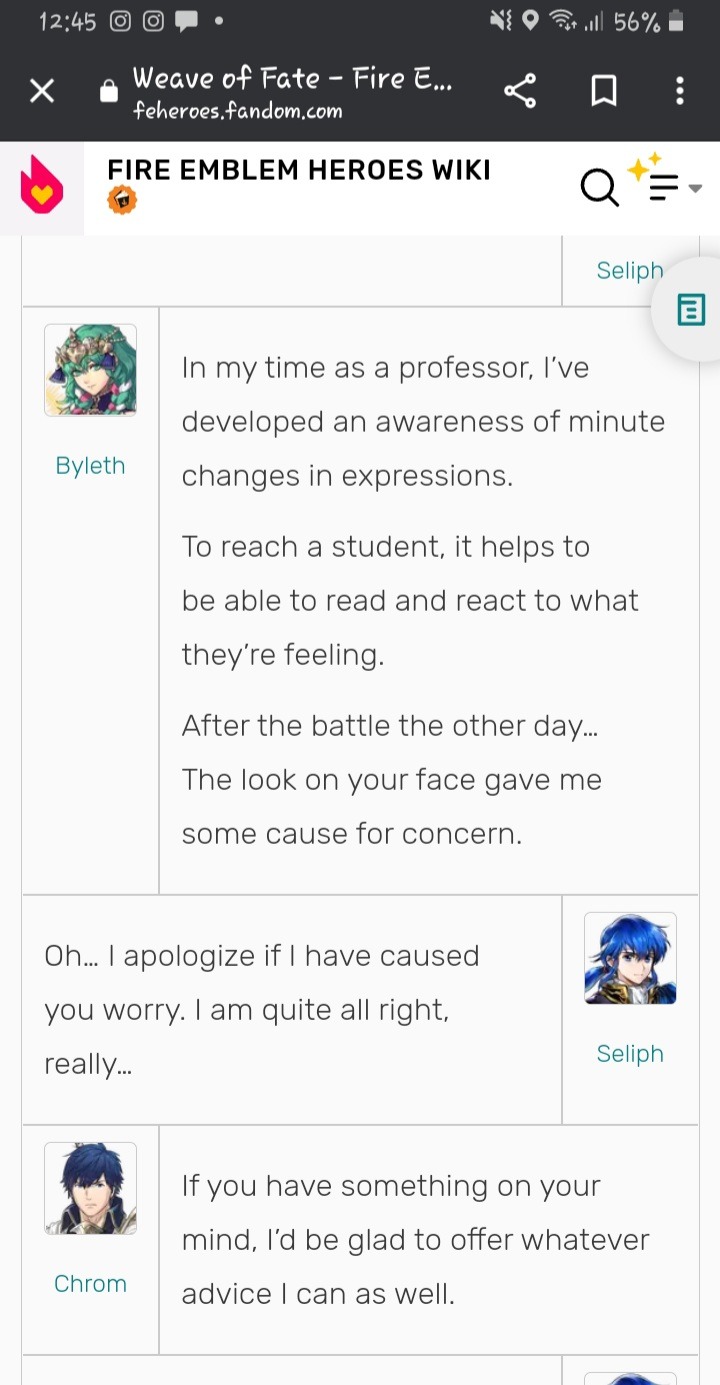
Curiously, teachers are people who constantly use Soft Skills, and this applies more heavily in Houses, since by being assigned as a teacher, Byleth develops those skills in a better way.
Unfortunately, Byleth does not go through that learning in Hopes nor have the authority. However, the ability to develop such skills is still there, since they are still a good listener, and they like helping people.
One problem to face is that Dimitri is so closed off and distant that he doesn't even pay much attention to the only interaction he has with Byleth.
But well, I think I got carried away and I should leave the rest of the analysis for later lol.
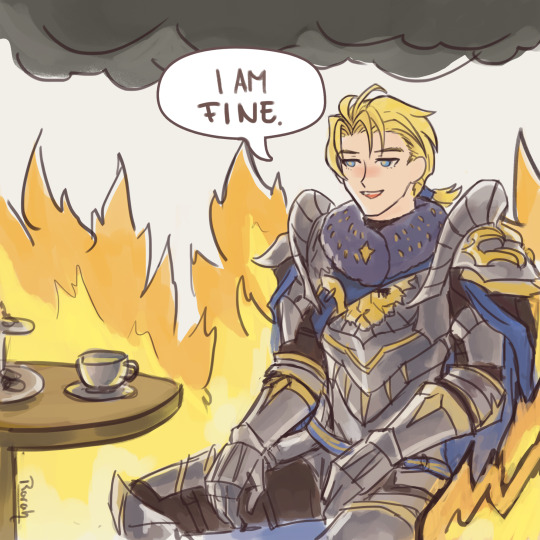
The mentally stable Dimitri Fire emblem 3 hopes.
It surprises me that there's still ppl claiming so, but then I remember we're talking about 3h interpretations and I have to make peace with it.
But that doesn't stop me from venting a little bit in this little space I have lol. Actually, it dries me and makes me feel bad to bring this up because I will have to talk bad about Dedue, and I don't want to talk Bad about Dedue. He's a genuinely good boy. But "Human" nonetheless, which means Flaws. I like Felix too but he's become some sort of a clown that doesn't make me feel too bad. I like Felix tho, In a different way.
Mostly talking about these two because the take that "Dimitri has better support system" baffles me because, technically, these two are his support system in HopesVerse. The persons who Dimitri relays on and seek solace/advice/support. The rest doesn't really tackle any of his personal struggles (aside from the Mage!Mitri frustrated dream, but that's out of the bad equation in our 'mentally unwell' set of pixels, and Shez only has a glimpse). Contrary, to Houses verse where the whole blue lions cast knew about his shit, didn't know what to do, but didn't leave either.
I tackled this topic with other person on Twitter who was (or still is) on board with this take and the phrase they used was They contained him better, which of course I agree and remarked that was exactly the problem. Contain him is gonna be contra productive. I used a water dam analogy, where the structure of such dam is damaged, and the pressure of water keeps accumulating. Causing a foreseeable damage for the dam itself and the surroundings. You don't need to be a genius to understand it, you need experience or knowledge for mental ill topics tho.
I really don't want to extend so much on here because it's mostly just, rant format more than a proper analysis so I just want to point out these two things in their support conversations.
First, Dedue. Encourage him to keep on the vengeful path. Which we know was the final goal of Azure Moon and if you payed attention to 3 houses message. The whole Vengeful argument was something Bad, to keep it simple. Despite Dimitri actively looking for answers/guidance for something that, in a rational state he can see clearly like vengeance will consume his life (also Shez and Felix called out this behavior). Dedue answer only encourage him to keep on that path, because he would do that 💔. Presenting 2 oposite views is a great formula for confusion and disorientation. Now, Dedue's role is primary SUPPORT, not guidance nor orientation. He will support his shit no matter what, and we are quite aware of that if played Houses.
Second, Felix. Felix is a special case. He is smart but also an idiot lacks A LOT of soft skills to actually be of help. He's the only one who knows in this verse about Dimitri having a mental issue. In their A support to say the least, so they don't close or solve anything. What makes it more worrisome is the fact that Felix conceals the issue as a secret.
"So try to keep that whole "removing their heads" thing in check, yeah? We can just call it our little secret."
this extract here makes me feel so unwell 😭help
The whole burden falls over him and his lack of skills and wisdom on the matter will be too much for him later on. He at least, will be able to recognize that the problem is beyond of his capabilities and will look for help. Felix himself has his own issues and journey where he needs to learn. He's forced to get pass beyond some of his angry teen behavior but hasn't completely get over it.
There is a lot more to tackle, but that requires more work and time. What are the topics some of you think is important to cover around understanding the Hopes verse resolution? Dimitri's route? something? Do you think the route without Byleth is better? With that being said, I would like to delve deeper into character analysis, and the role each played for the Lords too. That also requires to talk about the Byleth and needs a whole analysis on their own, which requires time (which i don't have much lol) To end this vent, I would like to encourage people to do a little research for the terminology they're using like "Support System". Who makes it up and how it operates successfully. The fact that ppl saying "he has better support system" only because he didn't go feral on the run alone is not entirely valid. A reminder that people can feel alone with or without people around them. And containing the issue within doesn't solve any problem. At best, it's presented later. At worse, it gets worse.
#reply#Warning: text wall#More hopes Dimitri analysis#Brief Byleth the professor analysis#brief Felix criticism#sorry felix but you haven't stopped from being an ass#and still need to grow#Felix cares for his friends tho#blue lions#fire emblem 3 hopes#fire emblem 3 houses#Azure moon#azure gleam#There's still so much to tackle in hopes#like that scene when his friends come to his rescue#and also A LOT OF SYMBOLISM#MORE HANDS!!!!!!!#This man is gonna be my HANDS Icon#Long post#fodlan ramblings and analysis
229 notes
·
View notes
Text
#Oscar #award
"Johnny Depp, one of Hollywood’s most talented and beloved actors of all time. It still comes as a surprise to many fans that he actually still hasn’t received an Academy Award. Here's why Johnny Depp deserves to finally win an Oscar.
If the Oscar is given to the best-performing actor of a certain year, Depp should have several statuettes by now. Depp is a multi-talented star, adding talented musician and an incredible painter to his already impressive acting resume. A prodigal son whose talents were discovered and put to use, the great Nicolas Cage was the one to encourage Depp to take on acting. One of his first successes in the industry was his role in What’s Eating Gilbert Grape, an American coming-of-age drama film directed by Lasse Hallström, following a young Gilbert who lives with his obese, depressed mother and his siblings. Depp’s talent is completely tangible through his performance in this movie, where he tries to balance his youthful dreams and hopes with his responsibility towards his mother and his mentally disabled brother.
However, it was not until his role as Captain Jack Sparrow in Pirates of the Caribbean: The Curse of The Black Pearl that he was finally nominated for the first time for the Academy Award. The Disney fantasy was an immediate box office success, reaching $654.3 million following its 2003 release. The story follows pirate Jack Sparrow (Depp) and blacksmith Will Turner (Orlando Bloom) as they attempt to save Elizabeth Swann (Keira Knightley), who was kidnaped by the cursed crew. This particular performance established the genius of Depp and drew the picture of his talent very clearly in the minds of viewers and cinema fans. He acted the role with everything he had: his voice, his facial expressions, his funny body gestures, and his emotions. Although the movie falls under the genres of fantasy and adventure, the viewers’ attachment to the character of Jack Sparrow reminded us of the kind of influence that characters in drama movies have. His talent alone was able to hook millions of fans without having to resort to dramatic effects, and complex dialogue.
Usually, when someone rises above the competition, it means that they are confident in their talent and what they bring to the table. Depp has always been different, not only in his clothing style but in his views and beliefs. In 2005, he told Vanity Fair that he doesn’t “want to win one of those things, ever” in reference to an Oscar, because it would mean that he was in competition with someone. Competition can be a great motivation for some, but others, only need to be in competition with themselves in order to move forward. Depp thinks competition is a negative form of motivation and refuses to enter the race. His high-self esteem does not allow him to measure his success by how heavy his trophy case is."
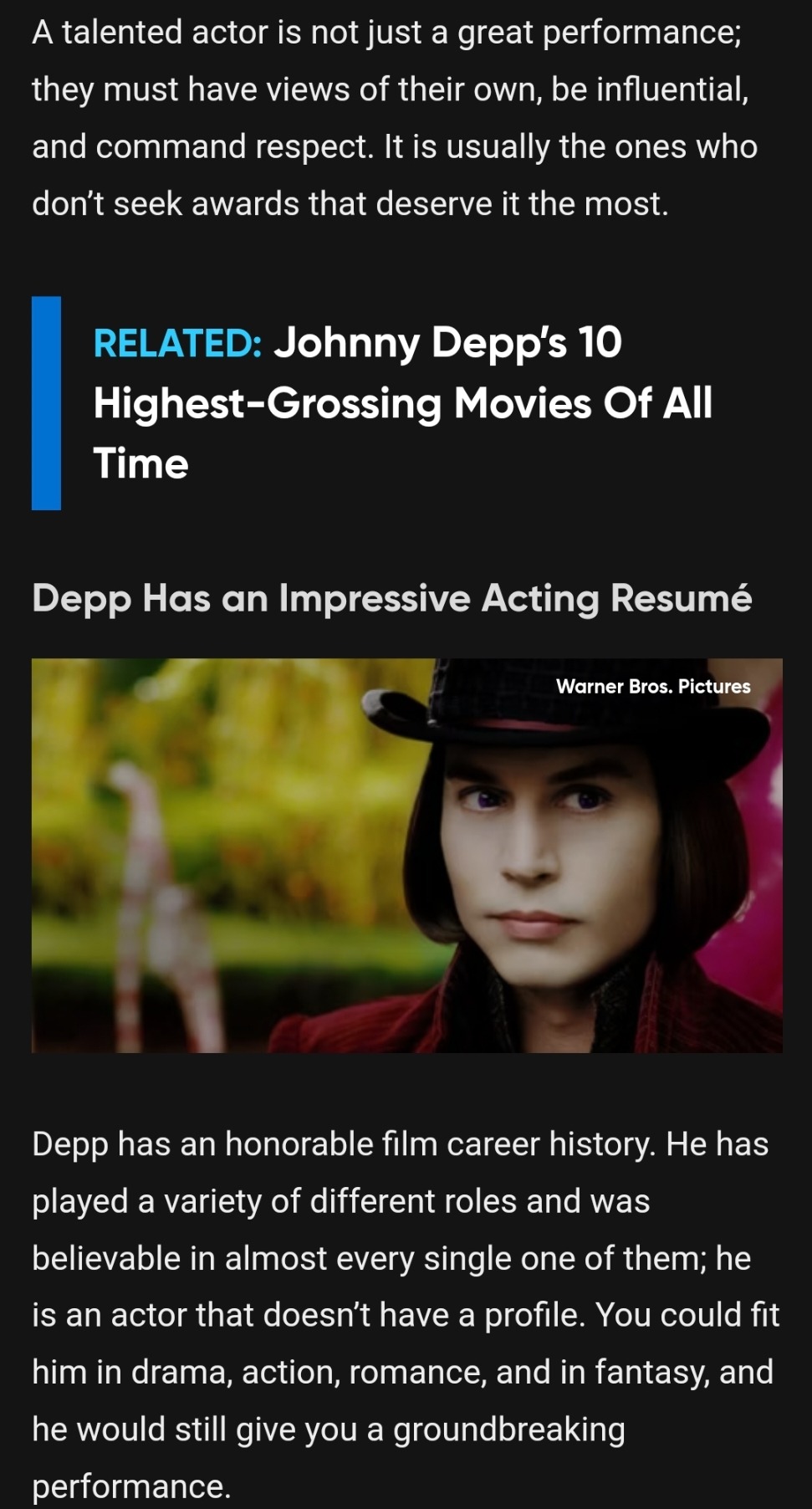
"One of the best is his titular role in Edward Scissorhands, which was a success both for the critics and financially. He played the role of a soft, and timid creation of a scientist, and his journey towards finding real connection and love. Although the character doesn’t get to say many lines, Depp is wonderfully successful in communicating his feelings, aspirations, and deepest needs for acceptance. This performance is just another reason why there should be a golden statuette in Depp’s hand by now.
He played The Mad Hatter in Alice in Wonderland with equal ease; with that amount of makeup on their face, only a handful of actors could pull off a fictional tea party quite as Depp did. He has also performed incredibly well in movies like Donnie Brasco, Finding Neverland, Ed Wood, and Black Mass.
Depp's fans might be outraged by this apparent lack of recognition, however, one must always hope that his Oscar is only being saved up for his next performance."
#article #excerpts
2 notes
·
View notes
Text
The Storm Inside
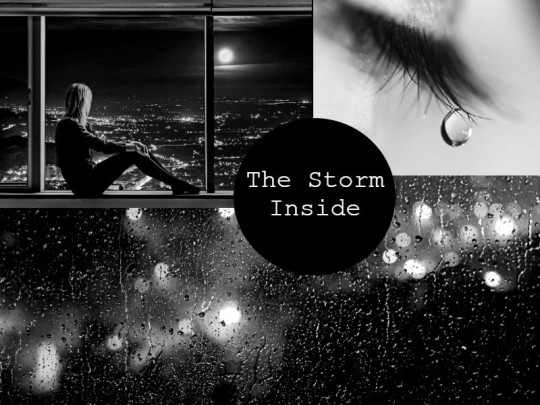
Title : The Storm Inside
Book : Open Heart series (Choices - Pixelberry)
Description : Casey has been pushing everyone away and spiraling since the attack on the hospital and her loved ones are concerned.
Pairing : none established / ambiguous
Characters : Open Heart FMC (Casey Valentine), Sienna Trinh, Bryce Lahela, Jackie Varma, Rafael Aviero, Elijah Greene, Aurora Emery, Kyra Santana, Danny (mentioned), Bobby (mentioned)
Warnings : mention of death, mental health
Prompt : “What’s the weather outside your window doing right now?...”
Casey stared vacantly out the floor length windows into the night sky above Boston from her seat against them on the living room floor. The sky was as clear as could be, a rarity for the area, but in a city as populous as Boston seeing the stars was a gift they were never granted. She stretched out her cramping legs to a different position as she leaned her head and left shoulder against the cool glass.
She looked out of windows with alarming frequency now. She had never really done so before, preferring to always be doing other things. She’d always thought of herself as a social person who enjoyed others company, though she could be either out dancing in a packed club or relaxing away a quiet night in with the same level of enjoyment. Friends and loved ones was all she really needed.
The attack on Edenbrook had changed everything, down to her very bones.
Some days her mood was somber but calm, like a cloudy day. Those were her best days and the ones she liked best. The cloudy days could be darker with threat of rain or lighter with the sun just missing the opportunity to come out. It was the closest to her old self she could feel. Unfortunately for her, those days were not only fleeting and the least common, they were becoming a rarity.
More often, her moods were a range of levels of sadness. All the way from a misting drizzle, enough to coat everything in water and make the air humid, to a torrentially pouring rain. Buckets from heavens and flash floods. The only thing those floods never seemed to leave clean was herself.
Other times she was cold. So, so cold. The best of those days were accompanied with a blizzard. Cold, but manageable with a shovel. On the days where she left her heart covered in an inch thick layer of ice and brandished her words like weaponized icicles, frigid and sharp, the people around her knew to steer clear. She was getting a little too good and stabbing them where it hurt.
Her worst moods felt like she should alert the National Weather Service. Tornado warnings and hurricane evacuations were a courtesy she never felt up to extending, adding to her already astronomical guilt. Like a twister, she could feel so angry and out of control she would tear through everyone in her path with no regard for who or what was in it. She had hurt people, especially the ones she loved, deeply but couldn’t bring herself to stop. It was like watching her body act with someone else at the controls.
It was just one more thing about herself to hate lately, and it had a long line to stand in.
The weather in reality never matched what she felt inside. It fascinated and disgusted her in equal measure. It had been sunny (mostly) since the funeral. It was repulsive.
Bobby was dead. Danny was dead. Raf had almost died and would have god knew how many long term problems ahead because of the illness. She had nearly died. And the world just kept spinning.
Couldn’t they see? Couldn’t any of them see that she was stuck there in that room. That she had never recovered. That she couldn’t recover.
At first, when her friends had noticed her strange new affinity for gazing outside for hours every night, they tried to pull her away. Distract her with things like herbal teas, chocolate ice cream and support. They tried to shower her with her favorite pastimes from before. They tried dancing around the apartment to silly pop songs and playing video games with her. But they didn’t understand. And they didn’t stop.
So she bit them. Hard.
Now they left her alone.
She was an awful person. She shouldn’t have been allowed to live. Someone should have realized it at the hospital and just let her die.
She could feel the tears well up again, stinging her eyes as her inner clouds started to rain again. The night sky outside stayed perfectly cloudy.
It was going to be a long night.
Sienna stood around the corner, watching her best friend shatter silently, as she had done every night for over a month. She whispered to those behind her, “Don’t you all see? Nothing is helping and she’s getting worse. After the last time she panicked when I reached out, I thought I’d give her space. We all did. But it’s not working. Does anyone have any suggestions?”
The gathered assembly of those in the cramped penthouse hallway who loved a young doctor named Casey watched her crumble, weeping without making a sound...and no one said anything. Some of the smartest doctors in the nation, and no one had an answer.
Not Bryce, who stood off to the side watching the pain on the face of the first true friend he’d made while at Edenbrook. Someone who had looked past the brash, self-confidence he used as a shield. The first person he hadn’t been afraid of discovering his past.
Not Rafael, who stood at the back of the crowd, down the hall, not able to stand to look at the person who made him believe he was worth as much to her as these intelligent, talented and more well off friends of hers. Not as she could no longer see how much she was worth.
Not Jackie, who was used to facing her problems by cackling at them until they scurried off with tails between legs or tearing them out with her teeth. But this was a problem that required delicacy, the type she had been shown by the very woman who now needed it.
Not Ethan, who leaned against the wall as he saw his protégé, the first person he’d ever believed in this much, destroy herself. She had forced herself, her goodness, into his life and helped fix his hurt self. Now it was his turn and he, for the first time, found himself at a loss.
Not Aurora, her rival turned friend who showed her at her loneliest that having friend was worth something after all. Not Elijah, a beacon of positivity who felt entirely inadequate with this situation that left her emotionally impaired. Not Kyra, desperate to find some way to give Casey the support she had given. Not Sienna, whose heart broke as she watched her very best friend, her dolphin, her rock in many ways fall further and further into herself.
Each one of them loved her. Each one of them cared for her. Each of them had a purpose and a reason to be at Edenbrook, but Casey was the glue that had held them all together. That glue, their foundation, was compromised. This time, they needed to find a way to save her. This time, she couldn’t waltz her way into a miracle seemingly handed down by the divines themselves to fix the situation.
Giving voice to their silent thoughts, Bryce whispered softer than before, “She needs us. She has to know it. She has to know we’re here somewhere inside, but can’t ask. Won’t ask.”
“We’ve already lost so much because of the attack,” Sienna said quietly. “We can’t lose her now. I can’t.”
“None of us can,” Rafael replied softly.
There was practically a flashing beacon over Casey’s head, screaming help me please. It was long overdue for them to stop ignoring it. For a few pregnant minutes, they all looked around at each other and back to her. This mismatched band of misfits and nerds, bound this night by their affection for one single woman. They stared at each other, desperate for answers…
Until the one who loved her most went rigid. Then stepped toward the rest, speaking slowly.
“I...may have an idea.”
[BREAK]
Notes : I left the ending open for interpretation on purpose. This story is not intended to be expanded on or have a second part. Y’all can decide who the person who loves her most is (and if that person isn’t presently named in my story, you can put them there yourself :D)
Also, I want to extend a heartfelt thank you to the amazing writers I’ve talking to lately. Due to some truly awful comments and the way they were affecting me mentally, I recently purged all of my works but a few from fanfiction.net, AO3, and here on tumblr. Talking to, interacting with, and just seeing you lovelies in action has led me to believe I should start to do this again.
Huge shout out to @jerzwriter and @lovealexhunt for being the lovely souls they are. You may have no idea who I am, especially on this blog rather than my main, but I will never stop being grateful for the positivity you put into the world. Thank you.
#choices#open heart#choices open heart#open heart mc#casey valentine#ethan ramsey#bryce lahela#jackie varma#rafael aveiro#sienna trinh#elijah greene#aurora emery#kyra santana#magnoliapip
10 notes
·
View notes
Text
the chanonpom rooftop scene; an analysis
so. what a proposal scene that was, huh?
like always, i’ll be breaking down the major chanonpom scene we got this episode. this scene was given so much meaning by both the things they said and the things they didn’t, as well as the parallels to other characters that have already been established, and scene framing and composition in general.
strap in, folks. chanonpom won, and so did we.

a quick comment on the flashback before pom walks onto the roof - i think this bit is so incredibly important. first of all, chanon looks so terrified and lost here. he clearly hasn’t thought his plan through - all he does is hold a knife to the director’s neck with trembling hands, a half-baked idea of revenge brewing in his head. doesn’t this say something so clear about chanon’s perception of pom and how much he means to him? he remembered out of nowhere that he was subjected to this torture and was forced to live without his memories for years. and yet he never even blamed pom - not for a second. this is the chanon we know, the chanon that was ready to give everything up for pom, who put his own name on that document so that pom could have his future. this echoes in something pom says later as well but either way, chanon’s first instinct is to exact some sort of revenge on the director.
supot, as he does, immediately manipulates him into thinking pom is the one who he should blame and take revenge on - and i fervently believe that supot used his power on him here. he grips his shoulder, the music goes quiet as the camera focuses on supot’s face: all clear signs pointing towards the fact that supot put him under his control. like it was established in this analysis, chanon never would have ever done anything done against pom willingly, considering the fact that he was ready to give his life up for him when he was just seventeen. but him being manipulated into taking revenge against pom is completely believable, especially when supot is the one behind it - as he has been with all of it. chanon was so impressionable and hurt and lost, and he took clear advantage of it.
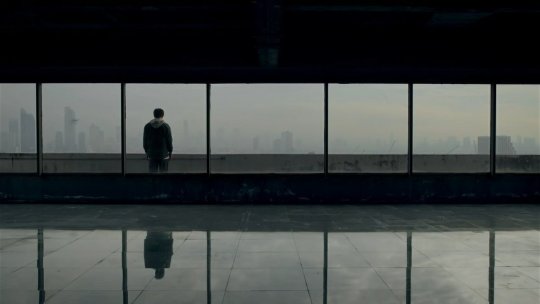
the composition and framing of this scene is beyond gorgeous. we start out with a shot of chanon on a rooftop, alone. as it has been established with pangwave, the rooftop is a place for vulnerability, for confessions, for the spark of love, and that’s exactly what happens here. just like for pangwave, chanon and pom’s safe space also appears to be a rooftop. moreover, we see chanon from the back, alone as he looks out over the city - the city that has housed him for all these years and that he has gone through without even knowing who he was, having lost everything remaining of him. we, the viewer, are removed from him in this moment as we see him from the back, through glass - because this is his moment. he starts off alone, like he has been for ten years now with nobody to reach out to, his only life force being to take revenge on his pom - a manipulated goal.
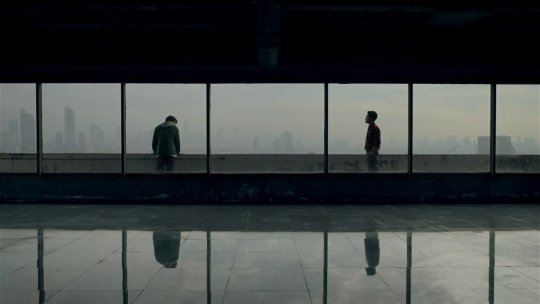
then we see pom walk in. chanon doesn’t look at him, doesn’t acknowledge him until the editors cut in with this wide shot again, directly following the last one where chanon was alone. this framing follows their reconciliation process in such a subtle and yet unconsciously noticeable way. pom has just moved into the shot, standing with his hands in his pockets and open, vulnerable towards chanon. his entire body is angled towards chanon, whereas chanon is angled away from pom - but still looking, still having turned his head. they start off on opposite sides.

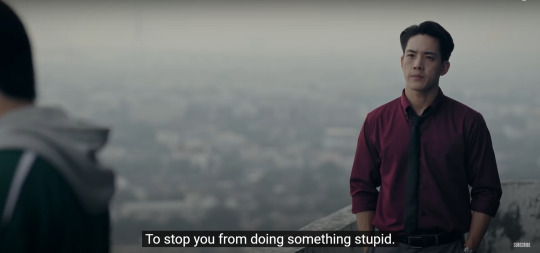

the care these two lines demonstrate is truly unreal. pom has just been stabbed in the neck with a virus that he’ll now have to deal with and take medication for his entire life, and still he loves chanon so much as to find him and go after him because he knows, in his heart of hearts, that he’s the only one who’s able to stop him in any way. chanon doesn’t expect this obviously, still not looking at him because he can’t bear the thought of what he’s done to pom, but pom doesn’t take his eyes off of chanon here once. it’s worth noting that chanon looks up at pom clearly, levelling his eyes with his for the first time, when he hears that pom has come to stop him from doing anything stupid. this is where he, too, realises, how much pom cares for him. even after all these years, even after everything they’ve done to each other, even after they’ve forgotten and remembered again. they meet in a new life.
again, this is a parallel to the pangwave scene in episode 11, where wave stops pang from doing anything to himself. both of these couples are incredibly romantically coded - what with their rooftops, their subtle ways of taking care of each other, and their utter devotion that shines through their actions. in chanon and pom’s case, the way pom comes to stop him here, the way chanon is ready to give everything up for him.


pom takes a couple of seconds to say this, clearing his throat and looking out to the city - the same place chanon looks when he’s contemplating or doesn’t know what to say - because this is forgiveness. this is him forgiving chanon. he doesn’t say it in the same words, but he says it in the way his eyes flicker down to the floor and then up to chanon, staying there for the remainder for the time until the next wide shot, like he’s waiting for a response. the magnitude of this does not go unmissed - as mentioned already, pom forgives him, even after chanon had injected a virus into him, whether through his own will or not. he clears this up for chanon, to make sure he knows that he could never be mad at him. again, it is very much worth noting that chanon doesn’t take his eyes off of pom once during his little speech here.
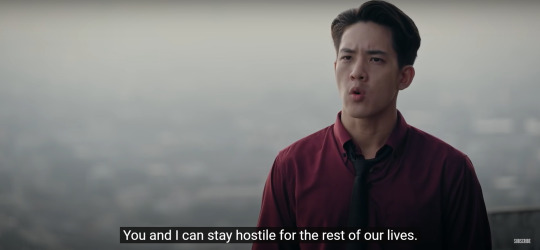

this is merely a continuation of pom’s forgiveness - but now it provides chanon with a choice. while he is saying that they could be hostile to one another forever, he is also presenting him with a question. pom is also saying: it is your choice now, what becomes of us. you can choose whether we stay like this, or if we reunite, if we work together. he appeals to chanon here to see things his way, to forgive him too. this also clearly expresses what pom wishes himself - that he and chanon reunite and become themselves again, because pom has spent so long without chanon that it hurts to live longer without him, knowing that he is alive.
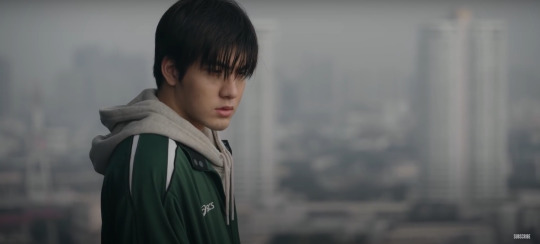
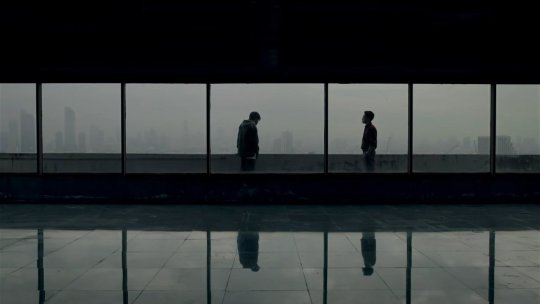
chanon looks away for a second, and then back out at the city, contemplating what pom has just asked him. he could have done anything now - moved away, gone through with what he was planning to go through with in the first place... absolutely anything. but he drags his fingers across the balcony, and moves closer to him. this is the part in the reconciliation process where chanon makes the choice to be closer to pom, both emotionally and physically, where he accepts pom’s olive branch and starts to forgive him.
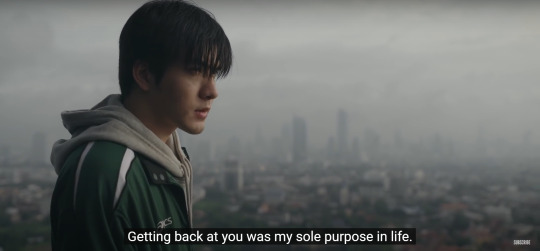

chanon continues with his side of the story here - how revenge against pom (that he was probably manipulated into by the director) was the only driving force in his life. but still - wasn’t it pom he lived for during his darkest times, whatever way it was? while that isn’t completely healthy, they’re building it back up. they’re getting back to where they used to be. chanon says he feels bad, and there we see a glimpse of seventeen year old chanon again, chanon from the gifted, the chanon who was so devoted to pom and the unfurling of his potential and his happiness. we see what he truly feels in this moment. what he doesn’t say here but means is: i’m sorry. i feel bad. please, let’s try again.

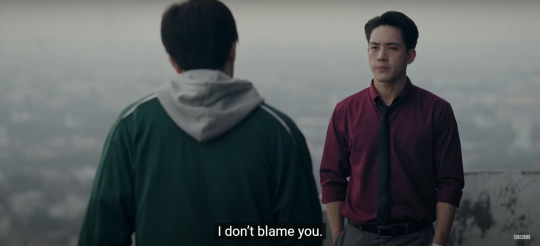

it’s here we see the true extent of pom’s feelings about chanon, in whatever way they are. when chanon says he feels bad in that small voice, his apology to what he’s done to pom, pom’s first reaction is to sniffle, looking away from him in order to not cry. what he says next seals his forgiveness, his desire to have chanon back in his life in whatever way possible, because he has been lonely for so long. they both have. he says he doesn’t blame him. even though chanon has injected this virus into him that could potentially kill him, he doesn’t blame him. he doesn’t even need an explicit apology from him - rather he tells him to forget about it because he doesn’t want him to hurt any more than he already does. the way he immediately throws it to the wayside... that’s the devotion and the pure love pom holds for chanon. he’s saying, essentially, with this: i forgive you. it’s okay. let’s forget about it - let’s try again.
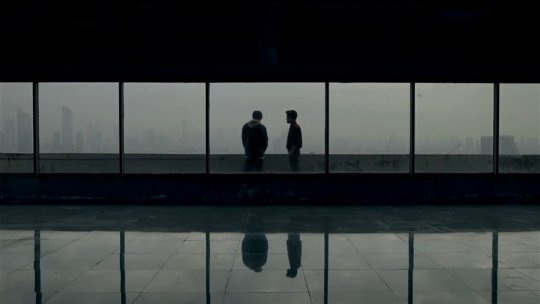
chanon turns away from him again, as if he can’t forget it, can’t forget what he did to pom like pom can’t forget what he did to chanon. but pom looks down, and moves even closer to him, as if he’s sealing the deal. he knows that he forgave chanon the minute it happened, and he needs chanon to know the same. this is the last step in their reconciliation process for now - chanon and pom having started out alone and at opposite ends of the rooftop, now meeting in the middle and finding themselves tentatively together again.
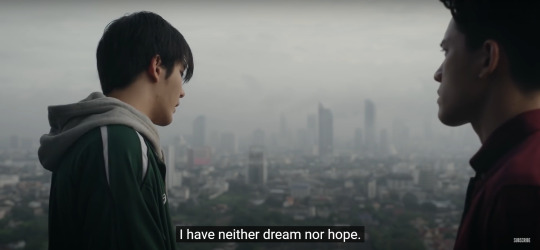

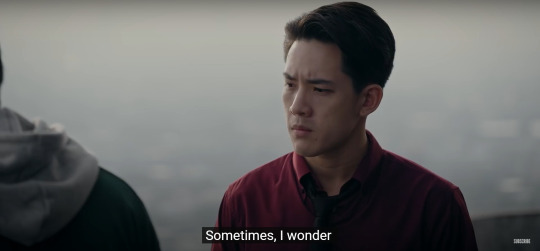
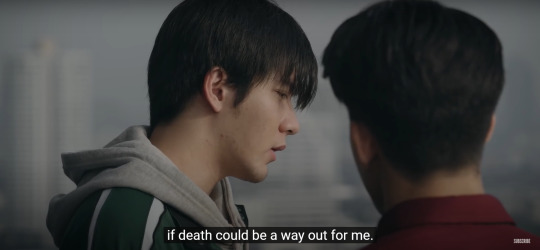
here we see more chanon and pang parallels, calling back to when pang said that maybe everything would be better if he died. these are two boys whose childhood was stolen from them, and who had to deal with the consequences with that mostly alone - chanon because he had no-one, and pang because he takes all responsibility onto his shoulder. chanon is almost like a future pang, someone that pang could become if he weren’t careful - hopeless and defeated, more than he already is. but through this scene, the show makes clear that you are never alone nor is it time to give up, through both pom here and wave in pang’s scene.
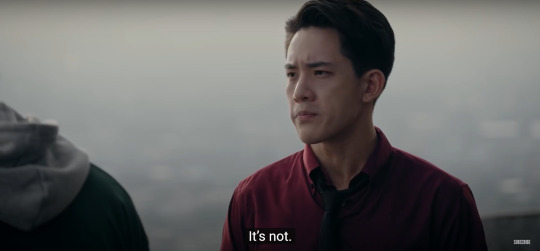

pom barely allows chanon to finish his sentence before he shoots out an “it’s not.” he cannot imagine his life without chanon in it, not anymore and not again. he needs to have him in it, cannot even let him believe for a second that he is better off dead. and this is where the wedding vow part of this scene comes through: “if i’m still alive, you must be as well.”
with this pom is saying: “as long as i am alive, i will be by your side.” with this, he is saying: “if i am still breathing, you must be breathing with me.” with this, he is saying: “i will go to the ends of the earth to make sure we are alive and together.” with this, he is saying: “i am devoted to you. we will make it together. we will work together. we will see the end of this together.” with this, he is saying: “you’re not allowed to die before i do.” with this, he is saying: “you and i are the same, our hearts are the same.” with this, he is saying: “i cannot fathom my life without you.”
of course, after this they decide to work together, having reconciled and reunited, and they smile at each other and stay close for the rest of the episode. in the preview, we see them with the gifted kids, working side by side as they always should have. it may have been ten or fifteen years too late, a long time coming, but chanon and pom have finally found each other again.
our khu pom and p’chanon - together at last.
#the gifted graduation#tgg#the gifted#chanonpom#the gifted: graduation#i am so tired why do i write analyses.... mhm i know why. to SOB.#either way i love them i love them i love them with all of my heart.#rahul.txt
58 notes
·
View notes
Text
Let’s Get Dangerous Review!
It’s dangerous. In a good way. <cue dramatic music> Okay, obviously there’s more thoughts than just that. I’ve been waiting for it for weeks, and it arrived just as awesome as I hoped. For the first time, let’s give my full movie style review to the double length Ducktales special: “Let’s Get Dangerous.”
The spoilers are open and widely discussed, so maybe don’t look past the following image if you haven’t seen the episode yet.
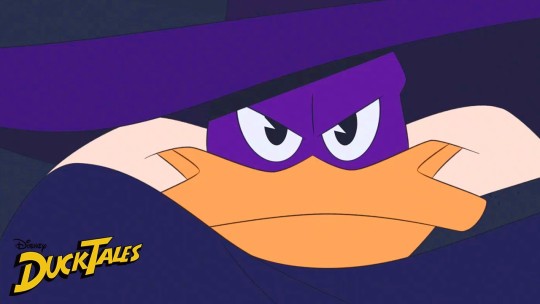
To note, I’m not entirely convinced that this was actually meant to be a pilot. It definitely does introduce a new status quo for the Darkwing trio of characters (minus Honker for now, here’s hoping they haven’t forgotten him), but it’s also a very remote story that still tries to take place within the context of Ducktales’ universe, so it really depends on what they choose to do.
But let’s just get down to it.
First off, as I mentioned in my earlier post… Taurus Bulba. He was maybe the biggest and most eye-catching aspect of the first part of the episode, as one of the few elements we hadn’t already seen yet, and his reputation as a really, really bad guy has quite preceded him. As I may have gushed somewhat about, he’s one of the best parts of the special.
James Monroe Inglehart, for those living away from the Disney scene for a decade, is an actor and voice actor most famous for being the original Genie on Broadway’s Aladdin. A grand, bombastic presence, he generally plays characters who - much like the genie himself - a big, jolly, kind but maybe a little mischievous souls that take the attention of a room and brighten up the characters’ day - like Lance, in Tangled the Series. The most interesting thing about Bulba is that Inglehart brings that exact same energy to the role, and so Bulba keep that jollity and lofty personality in a package that becomes increasingly less nice as the story goes on. As someone who keenly remembers Taurus Bulba as cruel monster willing to hurt kids and capable of crushing Darkwing like nobody’s business, the contrast was immediately fun to watch - and I kept waiting for the other shoe to drop.
In this story, Bulba is recast from a crime lord intending to use a super weapon go on an endless plundering spree to a FOWL scientist with a respectable reputation who intends to use a super weapon to take over the world, and the transition goes off fairly well. The end result is a pretty standard mix of superhero fight and Bond plot, as Bulba ends up holed up in his lab with his squadron of elite supervillain minions - all plundered a particular fictional universe - with the heroes having to break in / escape from his captivity and stop him before he destroys everything. It’s very Silver Age, with Bulba in the role of maniacal villain, and he’s contrasted very well with Bradford - who is as always an antagonist who prides himself on pragmatism. This contrast leads to some great moments: Bradford’s increasing frustration with the cavalier attitude of both the heroes and the villains gives him the best stint of characterization he’s had since the beginning of the season - he basically spends the whole episode arguing with everyone about how badly thought out their actions are, while also badly hiding his own secrets.
The Fearsome Five (of which Quackerjack is voices by his original actor) are great to see, though used minimally. If you’re expecting to see classic show dynamics between the villains and Darkwing, that’s not really what they’re used for. Mostly, they’re minions with personality, and they’re more there to establish both to the audience and to Drake the character himself that he is ready to take on really big threats even with his lack of superpowers.
But enough about the villains, on to the heroes!
A couple episodes ago, with the Halloween episode, I criticized that story for not balancing its A and B plot all that well. This episode does not have that problem. The story is actually maybe about three fifths Darkwing’s story, and the rest of it is Scrooge and the nephews as they figure out what Bulba is up to independently of Darkwing and try to stop him themselves. It’s somewhat similar to Timephoon, where they’re there constantly and are doing their own bid to solve the story but the focus isn’t primarily on them. Instead, we have some of the best “HDL actually matter to the story” bits of the show, where they escape Bulba’s prison on their own and lead Bradford out, all the while slowly figuring out that something is shady about the guy. Meanwhile, Scrooge gets stuck in the original Ducktales universe’s most memed scene, which was a fun gag (but not the best gag - that would be the one and only Bonkers D. Bobcat as the Harvey Bullock-style cop in the Darkwing show).
Which I suppose can lead to a digression about the mad science bit here. The alternate universes here are… interesting. I always pay special attention to how things like time travel or other dimensions or alternate universes work in a series, and this one reminds me the most - I think - of DC’s Dark Multiverse: a collection of universes that are both explicitly fictional but made real because people created them. Ultimately, it’s less as if the OG Darkwing universe exists independently of the Ducktales universe and more that the in-universe Darkwing show as a world based off of it that the characters can reach into. I wish the episode had delved into that more, and now you’ve got people trying to use it to look for more establishment of OG Darkwing elements (though I was fine with it being separate, perceiving anything else as rather needlessly inexplicable), but ultimately that is not specifically what the episode is about, and is kept rather separate.
So what is the episode about? Like you didn’t already know…

As always, Gosalyn Waddlemeyer is a little girl whose grandfather was done away with by Taurus Bulba, and who falls into Darkwing’s lap over the course of his adventure with him. Here, her grandfather is (possibly) still alive, just lost in the ether a la Gravity Falls’ Grunkle Ford. And like the mighty glazed McGuffin, Darkwing’s goal in the episode is less strictly defeating Bulba as it is helping her get her grandfather and her home back. Gosalyn here is self-sufficient and action oriented (it may be my inner Brooklyn 99 fan talking, but I loved Stephanie Beatriz as her, and kind of wish she had gotten a wider range of lines), taking on her own crusade against Bulba until she realizes she can go to Darkwing for help, and is constantly trying to pull him into the fight - even while he is reluctant, and no matter what the danger - so that they can win and she can get justice. But in the end, she has to accept that they might not be able to.
As a longtime Batman fan, I immediately recognized a plethora of Robin references with Gosalyn. She’s a kid who’s family was taken from her by a villain, given a surrogate home by the hero - like Dick Grayson. She’s a street tough who originally met the hero committing a crime, and who is both skeptical of his heroism and heavily critical of his flaws - like Jason Todd. And she’s a young genius with a lot of scientific knowledge, tech skills and common sense - just like Tim Drake. There’s even elements of Carrie Kelley or Terry McGinnis there, in her determined if not gung-ho approach to heroism despite her circumstances and the hermit-like behavior of the hero.
And in the end, this is a fairly apt comparison, because Gosalyn essentially ends the story more as a Robin figure than previously, now as Darkwing’s more of a ward and official sidekick alongside Launchpad. The story does not, to note, involve her being adopted by Drake or becoming Gosalyn Mallard. Indeed, they don’t really end up having that sort of relationship. They’re distant and don’t really know how to relate to one another, and not about to broach the subject of family except in distant terms. There’s ultimately far less emphasis than before on Gosalyn and Drake being similar and hitting it off on a personal level, or even really Drake keying into Gosalyn’s potential and spirit as a person vs an element in his adventure. Throughout the story he regards her as a victim to be saved, then ultimately as an ally with potential to be respected, and in the end he gives her an offer to take up the mantle along side him while they search for her family… which ultimately creates something very different.
For people expecting something a little more akin to the implications the show made with Gyro and BOYD, Gosalyn here. The implication that they could be a family is brought up by Launchpad, but neither Drake nor Gosalyn are really there at the end of the story - I want to say they’re not there yet, but the way the story goes gives off the impression that the dynamic duo dichotomy is the relationship for the two the writing is most comfortable giving them.
Again, I’m a longtime Batman fan, so I understand and appreciate the nod. It gives them a really cool status quo that’s distinct from what came before it. Still, the strong father/daughter relationship between the two was very much the heart and soul of the original show, an endearing quality that created the character traits we love about both characters, and ultimately one of the primary characteristics that set the Darkwing family apart even from most comic book superhero stars - so even if they made something great out of it, it’s a shame to see Ducktales ultimately keep that relationship at arms’ length.
But that’s less a criticism and more just something I wish they had chosen to do differently - and it makes sense for the 2017 team’s take on Darkwing, which has always been more focused on “irrepressible hero who doesn’t give up” - a pluckie rookie growing into his competence - than “former fool whose great potential is unleashed through the people around him.” The latter is there, sometimes, but it’s not prominent. Original Darkwing was a man made better by his daughter, while the modern Darkwing doesn’t quite need that to find the hero within.
The only (and I mean only) criticism I have is the way the characters kind of jump around in how they respond to things. Drake wanting more crime, and then freaking out when super crime shows up and it’s way more than he thought he can handle is fine, and is one of the better character bits in the special. It being unclear whether Drake is against fighting supervillains because he thinks they’re too powerful vs because he doesn’t want to risk Gosalyn’s safety is another thing, though - it seems the show intended to imply the latter but forgot to include the line somewhere, so it’s not inferred until later and Drake suddenly benching Gos towards the end lacks set-up.
For her part, Gosalyn is suddenly and quickly afraid to fight for a brief moment so Launchpad can inspire her to face impossible odds, even though it was hardly the first time she had done so in the special. The ending I think wanted the characters to be somewhere that the rest of the special hadn’t gotten them to yet. But it’s all good - it ends well, so all’s well. Best gag of the episode, btw? Fenton, who is awful at keeping his secret identity secret, has hooked up Darkwing with his own hi-tech hero lair. Darkwing, despite supposedly being a detective (or at least an actor playing a detective), ends up as one of the two or three people remaining on Earth who hasn’t figured out that Fenton is Gizmoduck. Darkwing considers himself good friends with Fenton, despite hating Gizmoduck. It’s actually very funny.
It’s as of now unclear what is coming up for Darkwing. We know the St. Canard characters are going to factor in more as the FOWL plot progresses, and this episode kicks that plot into high gear - the characters now know about FOWL and their intentions, and are preparing themselves for a far more dangerous fight than usual. In short, with the midseason comes the renewed focus on the primary plot of the season, as per the usual. Like I said before, while I’m not as on board as most with the idea that this was a pilot, St. Canard was definitely established here - with series regular Zan Owlson as it’s new mayor, and a general aesthetic and set of protagonists. It wouldn’t be remiss for a future episode this season to take place there (though we know Negaduck isn’t happening this season).
The new few episodes, however, are focused more on the quest for Finch’s treasures and FOWL, so that’s going to have to wait for a while. We’ve been promised, as I recall, an episode that brings all the kids together (unless that’s part of the finale), which is nice - I may have mentioned before that the best episodes of the series have been the ones that put the kids (who are the characters with the most focus throughout its run) together and let all their personalities run through an adventure together - and with the cast growing somewhat constantly, it’s nice to know that no one is being forgotten.
Either way, I give the episode a great deal of recommendation - I only had a couple things that bothered me, and a few wishes for different choices, and ultimately I’m planning on watching it a ton of times just like I did the first Darkwing episode. From a classic Darkwing fan, and in the words of Bat-Mite, it’s a different intepretation to be sure, but not at all one without merit.
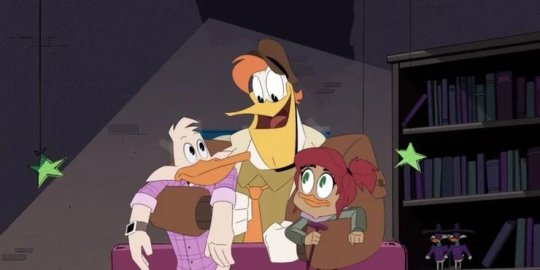
So thanks to Frank Angones, Matt Youngberg and the Ducktales crew! I hope my virtual thumbs up reaches them somehow, but either way, it was a good day to be dangerous.
#ducktales 2017#lets get dangerous#darkwing duck#gosalyn mallard#launchpad mcquack#scrooge mcduck#huey dewey and louie#taurus bulba#FOWL#bradford buzzard#90s animation#reboot#awesome#keen gear#Animated Minds for Animated Times#Frank Angones#matt youngberg#disney afternoon#crossover#animation review#television review
54 notes
·
View notes
Text
Dark Cybertron Chapter 1: Welcome to Comic Event Hell
You know what readers love? When the stories they’ve gotten invested in over the course of a couple years get interrupted for some pseudo-crossover bullshit.
And you know what writers love? When the story they’ve been crafting over the course of a couple years get interrupted for some pseudo-crossover bullshit.
Did I say love?
Because I didn’t mean it.


“Dark Cybertron” was penned by John Barber and James Roberts, with collaboration with comic writer and artist Phil Jimenez, and was published from early November, 2013 to late March, 2014. Atilio Rojo, James Raiz, and Livio Ramondelli did the art, each responsible for scenes in specific locations, with Robert Gill filling in as needed. Alex Milne, Andrew Griffith, and Brendan Cahill would also contribute pencils to the first issue and the back half of the series. It was a celebration of the 30th anniversary of the franchise, and the second birthday of Phase Two... which went on for over four months, but never mind that!
Both "Dark Cybertron” and its preliminary materials were made to go alongside the Transformers: Generations toy-line, each issue being included as a toy pack-in with whatever character was being featured… or, at least, that was the plan. Sometimes it didn’t work out. Regardless, this storyline was created to sell toys directly, as opposed to the MTMTE/RID series being made to sell toys more through the power of suggestion. It’s a small distinction, but important, because it will help explain any lack of soul one may perceive while they read “Dark Cybertron”.
“But Hannz!” you cry out, reaching to grab me by the throat and shake me like a rag doll, because to you I’m merely a faceless voice on the internet. “Surely by calling this specific storyline soulless, you’re completely ignoring the very nature of this franchise that you’re almost uncomfortably invested in!”
To which I’ll say this: look, I’m pretty realistic about where my giant space robots came from; Transformers as a franchise would not exist the way it does without Ronald Reagan introducing the Free Market to literal children and fucking up how we interact with media for the rest of time. There is no ethical consumption under capitalism, and that rings especially true when I’ve got a Spinister on my bookshelf staring me down as I write this, that was likely made out of plastics which either involved blood oil or unethical labor practices, if not both.
However!
The choices of a company to have their comic license holders to cook up an entire plot that derails what they’ve already got planned out for toy tie-in comics is a completely different animal than what IDW had had going on up to this point. Phase Two had been about exploring different ideas that hadn’t been able to be explored during the war, and seeing what happens when you take away a third of the logline for Transformers G1 as a whole. Being a part of a brand of toys was almost inconsequential to how the stories were being told; even the Spotlights, which were also toy tie-in comics, had plenty of charm to them, if only because there weren’t quite as many constraints placed on the writers, and they were stand-alone issues.
Of course, being tie-in comics isn’t the only reason that “Dark Cybertron” is a bit of a slog, considering everything IDW itself was trying to get done within this storyline, but we’ll cover the publishing company’s/Simon Furman’s/Transformers’ tumultuous relationship with the concept of gender identity and expression later on, when it becomes relevant to the story proper. This point also ties into the interesting origin of Windblade, who we’ll meet in a few issues, and what happens when you let your fanbase have a taste of power and forget that people might like to see themselves represented in the media they consume.
“Dark Cybertron” is what ended up making me stop reading MTMTE the first time I tried it in 2015. A big part of it was because it forced the reader to need so much information from RID and even events prior to Phase Two, it wasn’t very fun to try to parse what was going on, on top of the writing beginning to flag because of obvious constraints to what Barber and Roberts could actually do, both within their deadlines and the rules put in place by their higher ups for the event.
“Dark Cybertron” is the result of the sort of executive meddling that kills reader enjoyment by requiring writers to cram their two worlds together as quickly as possible, without the option to go for nuance because there simply isn’t time. The reason we have four separate artists for the front half of this story is because Milne and Griffith didn’t have time to draw both their current workload and “Dark Cybertron” at the same time... but sales probably went up due to the nature of how the story was published, so I’m sure they didn’t really see a problem with it.
That’s a general “they”, not a Milne and Griffith “they”.
In short, we’ve got license contract obligations, fan-poll obligations, and gender stuff fighting for space within the next 12 issues, which will be published in the span of roughly four months. Things are probably going to be a little bloated and sloppy.
Regardless of any of these points, this is what we’ve got. It’s not like it’s all bad- “Dark Cybertron” has the benefit of being written by two people who had been working closely before it had even been conceptualized. Barber was the senior editor for MTMTE, and IDW as a whole until he left in 2016. It also isn’t a proper crossover- y’know, where two completely separate titles get mashed together for a bit. MTMTE and RID exist in the same universe, just have their own things going on, so a decent amount of things still carry over without you needing to have read every single thing in both. The writing, while not quite up to par with pieces that had more creative freedom and breathing room between scenes, is still recognizable as being Barber and Roberts’. Their voices are still here, they’re just strained under the weight of everything that has to be said inside of 12 issues.
With all THAT out of the way, let’s dive in to Dark Dawn: Dark Cybertron Chapter 1.
We get a quick rundown of the most basic information you’ll need for this entire story to make sense, as we reintroduce the fact that Shockwave is an ecoterrorist with more agendas than a daily planner factory on meth, and also that he grows magic crystals. I don’t care what he says, the Ores are fucking space-magic. If you don’t want to read through all of RID for everything else, please see Robots in Disguise (2012), #1-22- A Recap, For Reference Purposes. We also get a quick rundown of the Lost Lighters’ deal, as Swerve potentially has a meta-episode.

Be careful what you fucking wish for, bucko.
Our story proper starts with a flashback to the shittiest road trip Cyclonus ever went on, as the Ark 1 finds itself at the edge of a mysterious portal. This is likely why he wasn’t super thrilled when the portal to Luna 1 showed up- portals are probably a touchy subject for him.

Jhiaxus doesn’t know what this portal is- surely this means that science has failed us, and it’s time to call in the religious crowd to try and suss out what’s going on here.

It’s moments like this that make me wonder what exactly happened in the Dead Universe that made Cyclonus’ cheek meat just pack up and leave.
Now, we know that Cyclonus is correct here, because we as readers have more knowledge than the characters at this point, but Jhiaxus tries to write off this theory as hogwash, because he is a man of rationality and science. This is a slight removal from his character in the present, whose most notable traits seem to be a lack of ethics and screaming.
Everyone here seems to be slightly different from their current iterations, actually; Galvatron doesn’t say a word as he steps between Jhiaxus and Cyclonus, only using his body to communicate that the scientist might want to back off. Cyclonus himself is certainly the wordiest we’ve ever seen him to be, droning on through his actual thought process before he comes to a conclusion on what exactly they’ve found. Compare this to the Cyclonus of today, who only deigns to grace everyone with his voice if they outright threaten him, have something he wants, or are Tailgate. If he were to ever pull this verbal meandering on board the Lost Light, people would probably assume he’s having a stroke.
Nova Prime- you remember him, don’t you?- gives not a fuck about the Dead Universe, only what it means for him personally. And what it means for him is more locations to subjugate, because he is cartoonishly evil. His character is the least removed from his present-day iteration out of everyone. He tells the crew they’ll be getting a little closer, only for the portal to do the work for them, by way of dark energy tentacles.
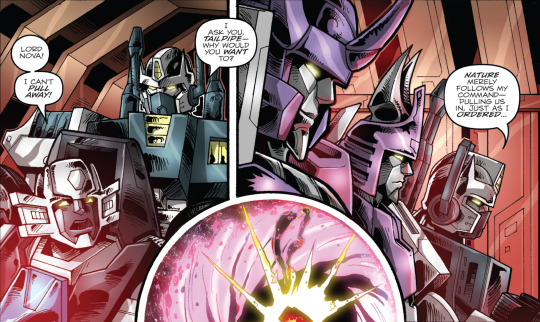
Wow, the pilot for the Ark 1 really is just straight-up named Butt, isn’t he? And what the fuck is that face you’re making, Cyclonus? Are you- oh my god, are you emoting? Oh my god, he’s emoting.
As the Ark 1 is pulled to its doom, Jhiaxus makes a quick phone call to Shockwave to tell him he’s his favorite, and to keep up the good work.
In the present, Shockwave reflects on just how friggin’ long this whole ordeal has taken. Fortunately, Waspinator and the Titan are almost here, and he can hardly wait.
Not, uh, that he’s got emotions or anything. It’s been established that he doesn’t have those anymore. Is impatience an emotion? Does that count?
Shockwave seems like he’d be really frustrating to write for.
Anyway, the Titan shows up, the Ore inside him and the Ore in the underground Crystal City combine, and the Titan starts screaming because everything hurts. Shockwave’s about as thrilled as he can be about the situation, given his lack of emotions.
Above Crystal City, we finally get back to that nonsense about the early sunrise, as someone- maybe Starscream, given the color of the narration box- waxes poetic on the planet of Cybertron, wartorn and wild in its rebirth, ruled by paranoia that has nothing to bounce off of, and so creates its own walls.
Then we get a detailed shot of Rattrap’s mug, and the moment is broken.
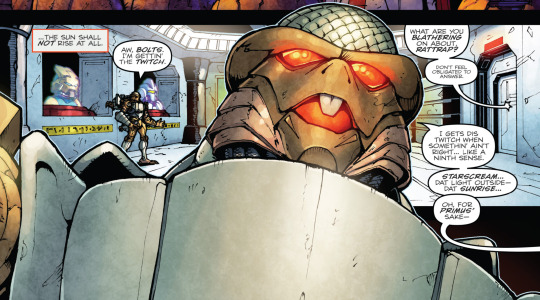
Rattrap’s character is a lot of fun in everything he gets tossed into, but you’re a goddamn liar if you think he’s pretty to look at. You are lying to yourself, and I won’t apologize for saying it.
Starscream walks out of his room in his hot new body, feeling fine and ready to take on the world. We’ll check in on him later in the day to see how that positive mentality is working out for him.
So, the sun hasn’t moved, and it’s way too early for the sun to even be up right now. That’s weird. Because I guess he didn’t know how the sun works, Starscream’s only just realized that this is perhaps a problem. He does some computer work and realizes that this is indeed a very bad thing, and asks that Rattrap call the Autobots. Not the ones who fucked off into the wilderness, the other ones. The gay, space ones.
Up in space, Orion Pax and his pals have found themselves in dire straits, the collapsing Gorlam Prime sucking their ship back down as the Death Ore consumes everything.

That’s not how engines work! And I think it really says something about the “Prelude” issues that I completely forgot why Wheelie was down an arm for a solid five seconds.
It turns out that Orion was the narrator the entire time, which I should have known- since when is the once and future Optimus Prime not the primary voice in any media he appears in?
It’s looking rough for the fellas, but luckily we’ve got to get the plot rolling, so the Lost Light VZZZZTs into existence and picks up the Skyroller to place it gently into its belly.
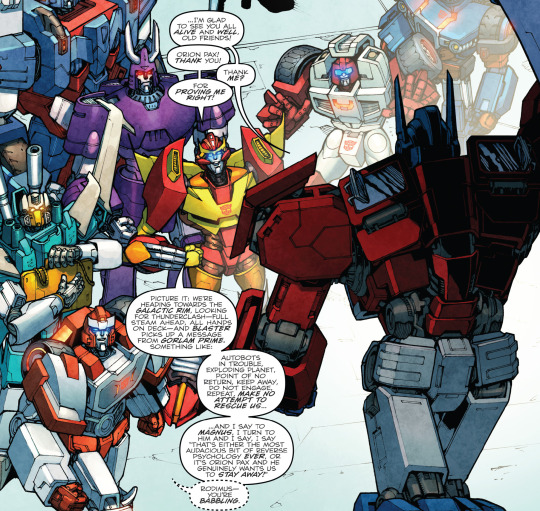
Orion isn’t exactly jazzed about the fact that Rodimus didn’t listen to what he told him, not even bothering to thank the guy for saving his life. I say y’all keep going on your Thunderclash Quest and leave this ungrateful loser behind. No space yachting for you, Orion.
The rest of the Pax Posse enter the Lost Light proper, and Hardhead reveals that he nearly joined the Quest, before he saw who all would be coming with, while Garnak has a tearful reunion with Rodimus. The fact that he’s calling him Sir- which I don’t recall him doing in Transformers (2009), at least not in a way that seems reminiscent of an unfortunate Antebellum Period Romance- feels rather weird, but I’m glad someone’s fucking happy to see Rodimus at least. Ultra Magnus asks Orion if he’ll be assuming command of the vessel, as Rodimus tries not to look horrified by the thought alone, but fortunately Orion’s not going to pull his “I’m Optimus Prime and I Can Do What I Want” Card just yet.
Smash cut to the bridge, as Rodimus tries to make himself sound competent, when Starscream calls. Orion doesn’t like that Starscream has their number, Perceptor almost reveals the fact that this ship technically doesn’t belong to a faction, likely due to being purchased after the war, and Cyclonus gets brought in for his professional opinion.
As it turns out, that early sunrise isn’t a sunrise at all, but a portal to the Dead Universe. This is a problem, because the Dead Universe really sucks, and you don’t want to go there, especially if you enjoy being alive. Orion seems more concerned about the fact that Starscream is ruling the planet, and Bumblebee is nowhere to be found.
Speaking of Bumblebee, he and all his camp buddies are psyching themselves up for a confrontation.

Swoop, please, this is hardly the time for crudeness.
The Dinobots, sick of Bumblebee’s dithering about, decide they’re going to fight the fucking sun and gear up. Prowl, though generally disliking their brand of problem-solving, does share his begrudging respect of their can-do attitude.
Their can-do attitude over fighting the fucking sun.
Then an earthquake happens and the ground rips open to reveal that Titan that Waspinator showed up with.
Shockwave takes over the narration at this point, and we get artsy, as we see events that haven’t transpired yet over musings on the nature of... time? Maybe? It would be in line with Roberts’ go-to topics, but honestly the whole thing’s kind of vague so I couldn’t give you a solid answer. Shockwave gets awfully introspective for a guy who shouldn’t care, I know that much. The point is, he is inevitable and is super good at logic and science.
Also, Nova Prime and Galvatron are back, which is cool, I guess. Not sure where Galvatron had gotten to exactly after the events of “Chaos”, but he’s back now, so it doesn’t matter too terribly much. Shockwave serves them, which we’ll probably get an explanation for at some point.
God, you can practically taste the desperation to pin all these plot points together before the entire thing implodes on itself.
#transformers#jro#dark cybertron#issue 1#maccadam#Hannzreads#overthinking about robots#incoming analysis#text post#long post#comic script writing
87 notes
·
View notes
Text
NieR Replicant (Part 1: History and Myth)
NieR Replicant begins with a boy, huddling in the corner of a derelict store, nestled in a ruined city totally devoid of any signs of life. We are told by expository text that this is summer, and yet snow falls from the sky and somber operatic vocals create a sense of sadness and loss, rather than one of rebirth and renewal. This is, we come to sense, a instance of humanity itself on the verge of extinction. The player takes control of the boy who, wielding a long metal pipe, fights off misshapen humanoid creatures who stagger forwards towards him, swinging heavy blades and displaying only an instinctual drive towards destruction. After the initial fight, the boy turns back and retreats to an aisle in the store where a young girl, his sister, “Yonnah”, lies in wait. She is sick, likely dying, and he is struggling to protect her from threats coming from without even as she is consumed by the disease attacking her from within. His struggle, we see, is a futile one. There is no help to be found, no medicine to give her, and no sustenance to aid them, save for a single cookie rescued from a tin by Yonnah while the player was fighting to protect her. In this moment of desperation, Yonnah resists her brother’s urging that she should eat the entire cookie herself and expresses a reciprocal love and concern for her brother and his health, insisting that they split the cookie in half. Love and a willingness to sacrifice in a time of crisis is here cemented as one of the game’s central themes.
A jolt, the cookie falls to the floor as more enemies appear and another fight begins. The boy reaches out to a book, a tome of knowledge, a record of the past, in order to gain magical power necessary to fight off these invaders. He had previously resisted the book’s appeals to him, which were spoken out loud by the book to signal it’s magical sentience, but now succumbs to it. He had previously told Yonnah not to touch a similar book that lay by her side, but he chooses to make the sacrifice he wished to spare her from. We don’t really know the reason for the boy’s initial distrust of the tome, but it is clearly signaled. After defeating waves and waves of dark creatures, there is stillness and the boy returns to his sister only to find that she too, in this moment of desperation, had succumb to a temptation for the power to protect another that the book had signaled. But unlike the boy, whose covenant seems to have increased his strength greatly, the girl’s choice seems to have weakened her even further, bringing her closer to death. Running across her skin and emanating outward like inky discharge from an octopus are strange black words, which we will come to learn are the symptoms of a new disease, a sinister unprecedented threat to humanity that had emerged out of a moment in which salvation seemed, if not assured, at least possible for the first time. Holding his sister tightly, the boy screams to the heavens, pleading for help despite the impossibility that anyone will hear his cry.
This is the opening sequence of NieR and it is one that the player may or may not think about quite a bit as the play the game because it’s relation to the totality of the events that follow is evident and yet never fully made clear. The rest of the game takes place in a setting that is entirely removed from this opening sequence. We are told it is 1,500 years later, humanity has not disappeared, but has reverted to a pre-modern state, living amidst the ruins of modern civilization. What remains, curiously, to link us to that moment in the supposed past is the exact same boy and girl in a nearly identical situation. The girl is sick, the brother wants to help her all by himself. The girl, frustrated by her own inability to act, seeks out a higher power, this time a rare and beautiful flower that promises luck and wealth to any who obtain it. She searches in a ruined temple where she is overcome and falls into a magical coma, but the brother tracks her down and rescues her. However, upon their return home, the same dark words emerge from her skin, only now we have a name for the condition that produces them: “the black scrawl”. The boy knows of this disease as it is already running rampant throughout his world. What’s more, he knows that it is fatal. But a chance presents itself, an ancient book that speaks and grants magical powers is found at the site of the sister’s imprisonment. A legend of unknown providence tells of a struggle between good and evil, between light and dark, in which this book somewhat ambiguously holds the key to vanquishing a dark plague from the land. And so begins a quest, to fight the dark creatures, “shades” as we now know them to be called, that threaten this land so as to unlock the full power of the book with the aim that in doing so, eventually, the sister, and all the others who suffer with this strange disease, might be cured.
How is it that the exact same boy and girl came to be involved in such a similar situation, albeit in such a different context. They do not appear to know of their past life. Were they saved somehow, delivered from their impending demise, only to have to face it again? Many possibilities may spin through the players head, but ultimately the game chooses to leave this matter unresolved. We never learn how it is possible that the boy and the girls survived their ordeal, how they have come to exist over a thousand years apart from when we first witnessed them. And in the absence of such knowledge and in the repeated echoes of their story, as it recurs in elongated form in the game’s present, we come to understand that it only makes sense if we ascribe to it, at least partially, the status of myth. That is to say that we are not meant to understand these two sets of events within the game as causally connected, preceding from one to the other in the manner of history, but rather as a timeless and eternal cycle from which essential patterns of human existence can be observed and reflected on.
The question of the relation between myth and history is thus entertained, but left open. We are led by the game to think about how these two symmetrical stories might be causally linked, but such a link is only alluded to and never fully substantiated. The passage from myth to history is essentially a sort of transcendence, a passage from one knowledge system to another. Such a transcendence is inherently unrepresentable because neither system of knowledge can account for the other within the limits of its own terms. This is a complicated way of saying that, for instance, once historical causality between two sets of events, one existing in the mythical past, the other in historical present, is established, the past events would cease to be mythical because their essential, timeless character would be invalidated. The only way this transition could be represented is if there were some way to figure the transcendence of humanity, or human consciousness, from one state of being/knowing to another.
In NieR, the basis for thinking causality between the opening’s mythical past and the main game’s historical present is through the transcendence of one reality for another. Specifically, a transition from a biological reality to a digital one. This possibility is conveyed to the player as the possible result of an experiment referred to as “Project Gestalt”. Put simply, Project Gestalt attempted to separate human minds from bodies because said bodies were failing, consumed by disease and thus no longer capable of supporting life. After human memories and consciousnesses were separated and preserved, they would be implanted into new bodies, known as replicants (in an homage to Blade Runner), which would be immune to the disease and thus capable of allowing human life to continue unabated. The many difficulties in conceiving how such as transformation of humanity would be possible (how is consciousness extracted, how are the replicants made, how are human consciousness and replicant combined) are eventually, in the game’s conclusion, resolved to the degree that it is implied that all that we have seen before us in the game’s main narrative has actually been playing out in a simulated, virtual world (which, in my mind still doesn't really resolve these questions, but it does make answers to them slightly more plausible given the godlike control that programmers have over virtual systems).
The transcendence of reality represented by Project Gestalt is plausible, but also unsubstantiatable. For us to acknowledge it as actually occurring, we must be willing to accept that the boy we witnessed in the game’s introduction was somehow able to save his sister, as well as humanity at large, by transferring their consciousness, as well as his own, from the reality that he had lived in to a simulated reality that he created (or that was created for him). This scenario is unlikely at best given what we see of him and his past, but not impossible. The game chooses to leave the connection between the events of the prologue and the main game unresolved. Thus, it figures this transcendence as a gap, or an abyss, in which the unthinkable can be thought, but not ascertained.
However, even as it makes this specific passage from myth to history thinkable, it moves to invalidate it in a counter motion in order to keep the sense of it’s mythical, rather than historical, resonance alive. Once we become aware of the premise of Project Gestalt, as well as it’s limitation – it turns out that the new replicants bodies are themselves afflicted by the disease they were designed to protect humanity from – obvious contradictions begin to arise that threaten the coherence of the narrative of transcendence outlined above. Among these are the presence of the black scrawl, shades, and magic, things that make sense in a simulated world but not in a biological one, in the events of the game’s prologue. Furthermore, it is heavily implied that the cause of the black scrawl, of humanities impending extinction, is an incompatibility between Gestalt (the human consciousness preserved and implanted) and Replicant (the artificial body and receptacle). This incompatibility stems from the replicant’s own status as a form of intelligent life and manifests in the “devolution” and madness that occurs when two sentient entities, Gestalts and Replicants, are forced together, leading them to become Shades. If this is true, because the black scrawl and shades were already present within the prologue it is implied that the boy and girl from the game’s opening were already not the “original” human beings, but themselves composites of Gestalts and Replicants (or something like them) and thus susceptible to the black scrawl. This casts the events of the game’s prologue as already located in an uncertain cycle wedged between myth and history with its own past that remains inaccessible. While it’s possible to see this prior instance of the black scrawl as a metaphor for something else, the ruined cityscape and unnatural weather seem to suggest the figure of climate change as well as the underlying incompatibility between human and environment as the proto-form or ground for the later Gestalt-Human metaphor, the game is insistent on primarily representing this crisis, i.e. Shades and the Black Scrawl, in a manner that is identical to how it is represented in the game’s present. As such, a return to the game’s beginnings, even with the total knowledge of the game’s conclusion in hand, suggests the mythic structure of eternal recurrence and repetition more than it confirms a possible, but fraught logic of transcendence.
There is always a gap or an abyss that links myth and history and the speculative terms which we may use in the attempt to overcome this gap really also serve to open up further gaps about a deeper history that we still lack access to and to insist on a mythical ahistoricality that asserts its ever-presence. NieR is a game that is acutely aware of this paradox and the many ellipses and instances of logical imprecision that it includes throughout its narrative (beyond the one that I have focused on here the ways that it tells the story of it’s other main characters, notably Emil and his multiple transformations is a good example of another) are most productively understood in this manner. As such, as much as we may feel compelled (myself included) to criticize the game’s narrative by pointing to these details as plot holes or instead, to forgive them as instances where the player is expected to entertain the suspension of disbelief for the purposes of more immediate emotional gratification, I would argue that we do better to see NieR as carefully and compellingly articulating this mess of tangled cables that arises from the attempt to tell stories that can satisfy the timeless desire for enduring truth while simultaneously acknowledging our particular need for immediate logical coherence. They reflect a unique form of cultural desire for a particular sort of story that is able to balance the affordances of myth and history without succumbing to the logic of one or the other.
A more general account of this tendency would emphasize how common the preference for ambiguity is in modern art. This sort of ambiguity, where we’re not quite sure what framework to use to understand how the events in this story relate to each other is common in modern art and seems, most obviously, to reflect an anxiety or insecurity about the efficacy of our established systems for understanding the world around us, telling stories, and making meaning. I do think this makes sense in relation to NieR, since extinction and rebirth are themes that exist around a nexus of great anxiety and that knowledge in the game and the human relationship to it is a specific site of specific anxiety for many of the characters in the game’s narrative. However, more specifically, I would also account for the significance of this desire in the following way: The game wants to tell a sort of mythical story about human extinction and rebirth, but it also wants to say something about its particular medium: the digital game/system. These two strains of desire are connected; something about digital games/systems in particular are connected with myths about extinction and rebirth. Additionally, something about digital games/systems gives them a stronger connection to a mythical worldview than what is typical in other media of modern art. I would argue that this likely has to do with the presence of the player and the role of their behavior in relation to the game/system which is both mythical in scope, repeated across many games and even repeated within a single game (like NieR), while also being particular to each game. Something that I’ve started to see as a recurring theme across several video games, including in Kojima’s Death Stranding, another game about extinction and rebirth, is that human beings are something akin to a different species when they are playing games (”homo-ludens” as they are referred to in that game). Thus, interacting with systems seems to imply something like extinction and rebirth for humanity in the eyes of some of their creators.
2 notes
·
View notes
Text
Had a thought again, the saying "yesterdays heroes are tomorrows enemies" which was a sentiment about how tons of tankies back in the cold war would dispose of their muscle to remove the risk of being upended themselves after they did the dirty work or any other possible dissidents
But suddenly i thought of an original gundam story that could use that phrase in multiple contexts as a tagline for its story
I was thinking about how colonization and loss of collective identity create nationalist movements and 0079 paralleling that with Japan, i feel a similar thing happened with Vietnam
During WWII the US trained vietnamese soldiers to harass Japanese troops stationed in Vietnam and the people who volunteered (like ho chi minh) saw it as an opportunity to try to vouch for their peoples independence after being a french colony, but after the war the US treated vietnam like property to be returned to the french because that was their terms to agreeing to join NATO, which greatly angered them and caused them to be disillusioned with the us and became radicalized
Its often told that despite leading a movement, minh would eventually be cast aside from his own peers for their own ambitions once he became too old.
Notes about this series
Main character is a girl, with tan skin closer to how southeast asians look
The earth-a-like would be referred to as "the central planet" as earth federation is parallel to the US, the moniker refers to the US's spotlight in world politics as well as their own self absorption
The planet to parallel Vietnam is a dense two layered canopy jungle planet called Verdia because im brainstorming right now, and is a colony of the central planet
The first episode shows disturbing normalized things in the girls life as she runs an errand like carrying water; she memorized the location of land mines on the road as well as being completely unfazed by the sounds of battle nearby and constant bombing runs of mobile suits dropping bombs or burning trees in the upper layer canopy for better visibility, because the 2nd layer obscures even mobile suit vision by being just as tall as them. Shes heard stories of bombs that were dropped but didnt explode and how some of her friends died by getting too close to them out of curiosity and then suddenly exploding and knows to steer clear of ordinance even if it looks already used
Most of the central planet soldiers are around her age too, one night in her village she has an uncomfortable encounter with two of them wandering, obviously inebriated or on something else, and has to fight them off and steals one of their mobile suits and has to kill them to survive. The stress of having her idealized perception of central planet soldiers that was shown to her and being forced to kill to narrowly avoid sexual violence and death causes her to physically break down in the cockpit once the fight is over.
She is eventually found by a guerilla bloc that opposes the central planet and works with them, her uncanny survival ability owed to her understanding of the ecosystem (such as using firmer trees to make harder turns than MSes normally can) as well as the instinct shown in the beginning thats kept her alive up to this point. While she has a mass produced grunt suit (eventually customized), the gundam of the story itself is piloted by who would be her rival
Her rival embodies the idealization of Lyndon B Johnson’s “Hearts and Minds” program. A conscientious, compassionate soldier who truly wants to do good by the native population of the Verdians, but has misinformed convictions of what he’s been told the enemy is due to a lack of perspective. Disciplined to a fault, his rigid but noble nature clashes with those under his command, leading to a fragging attempt later on. He allows a private journalist to shadow him, with his naivety thinking that he can be a positive and benevolent force among his peers.
His MS is the only with beam tech, in particular there is an anecdote of one of his men wish he’d just use the beam saber to cleave down the jungle so they can get a better visual, reminding him in a time of which he did exactly that, which caused a mudslide that decimated a nearby village. The rest use machetes and ballistic weapons
The central planet has plenty of enemies beyond their reach, some of which fund the guerillas on this planet, but to avoid stretching the span of the plot this wouldn’t be too heavily focused on.
By virtue of a proxy war, the central planet has trained locals who believe in their cause to fight their own kind, in order to minimize casualties of their own
While they skirmish a few times before, a major turning point in the middle of the story is a parallel to the My Lai Massacre, his men organizing bombing runs and sortieing their MSes behind his back on a village due to their frustrations, betrayed expectations of wanting to go hunting for enemies rather than protecting and supplying locals, fueled by distrust and xenophobia for Verdians. The girl and the rival decide summarily that they have to work together, fighting together at first, and then she leaves the rest to him so she can try and protect some civilians, taking some children into the cockpit with her. Though she tries her best, many still die needlessly, causing her to cry uncontrollably clutching her head and pulling at her hair. The children make themselves small and hold each other, like walking in on a parent in a moment of emotional weakness they know they should not be looking at. The event ends with them having a tense and uneasy but mutual respect for one another.
The rival becomes disgusted beyond reconcile and deserts, realizing he could never have disciplined by example nor led by virtue, and that the attitude the central army has towards verdians is fundamentally wrong to its core (in which he recalls his CO who resembles General McArthur speak of verdians as savages whose natural state is chaos and evil)
The girl begins to doubt her place among the guerillas as they yearn to “reclaim” a national identity which they have not been able to call themselves true Verdians having been colonized by multiple nations with deeply vested interest in their resources, or being used as a staging point to reach the central planet. The movement for freedom begins to turn into a call to establish superiority by a show of strength, boldly planning to make a move to annex the capitol to prove it.
In the end of the story, rather than fight a battle trying to beat the central army, she needs to deliver the recorded proof of atrocities that took place on verdia to the journalist that the central army tried so hard to bury, in a 3 way battle between her, the central army, and her former allies she no longer wishes to associate with in the destruction waged in the capitol city during a mass evacuation effort, scenes mirror the infamous images of people clinging to helicopters taking off as they fill the helipad
The central forces eventually leave due to political backlash, but the planet is a smoking crater, cities ruined, millions of her own people dead, and despite her efforts, her own fellow verdians would later be consumed by propaganda from the central planet and defend their actions despite everything she did by the time she becomes an old woman coping with her trauma
The rival is publicly awarded by his government for heroism for his intervention during the massacre, but in private is court martialed and dishonorably discharged, while government officials lament the plummeting of their outside image while alluding to the Domino Effect.
7 notes
·
View notes
Text
How To Become A Free Individuality
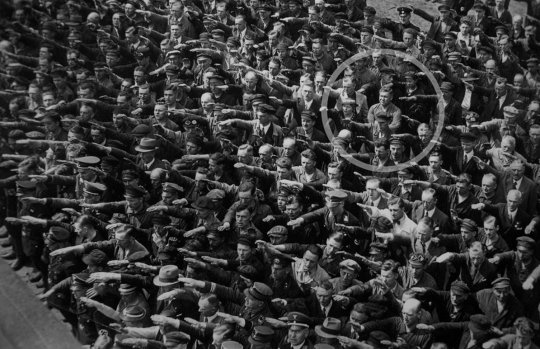
The view that the human being is destined to become a wholly independent, free individuality seems to be contradicted by the fact that he exists as a member of a natural whole (race, tribe, nation, family, male or female) and that he acts within a whole (state, church, and so on). He exhibits the general characteristics of the group to which he belongs and what he does is determined by the place he occupies within a community. Given all this, is individuality still possible? Can we regard the individual human being as a whole in himself seeing that he grows out of one whole and fits in as a member of another?
The characteristics and function of each member of a whole are defined by the whole. An ethnic group is a whole and the members belonging to it exhibit characteristic traits that are determined by the nature of the group. How the single member is constituted and his general behavior will be characteristic of the ethnic group to which he belongs. This is why the physiognomy and behavior of the individual has a typical quality.
If we ask why a particular thing about a person is like this or that we are directed away from the individual person and toward his group type. The type is used to explain why something in the individual appears in the form we observe.
However the human being frees himself from these typical characteristics. He develops his own traits and roles for reasons that can only be found in himself. What is typical in him serves only as a means to develop his own individual nature. He uses the characteristic traits given by nature as a basis and gives them a form that expresses his own individuality.
If we look to the laws of type to explain the individual aspect of a human being we will seek in vain. We are dealing here with something completely individual that cannot be explained by something else. If a person has advanced to the point of emancipation from what is typical in him and we still want to explain everything about him in terms of type then we have no sense for what is individual.
It is impossible to completely understand a human being if one's judgment is based on concepts of the type. The tendency to judge according to type is most persistent where differences of sex are involved. Man sees in woman and woman in man nearly always too much of the general characteristics of the other sex and too little of what is individual in the other.
Positions in society are not always determined by the individual characteristics of each person but by the general ideas of what is considered the natural role and needs of a man or woman. Our activity in life should be determined by our individual abilities and inclinations not solely by the fact of being a man or woman. Neither man or woman should be the slave of the typical, of the general idea of manhood or womanhood.
As long as men debate whether women are suited to this or that profession "according to their natural disposition" no progress will be made on the so-called women's question. What women are capable of according to their nature should be left to women to decide. If it is true that women are only suited to the professions that they are now in then they will hardly have it in them to attain others on their own. But they must be allowed to decide for themselves what is appropriate to their nature.
This view should be held for any individual seemingly forced to fit within a "social norm" that seeks to define an individual according to the group. Let's tweak the above paragraph to read more generally.
As long as people debate whether a particular individual is suited to this or that profession "according to their natural disposition" no progress will be made on the so-called equality question. What an individual is capable of according to their nature should be left to that individual to decide. If it is true that a particular individual is only suited to the professions that they are now in then they will hardly have it in them to attain others on their own. But they must be allowed to decide for themselves what is appropriate to their nature.
Whoever judges people according to their typical characteristics stops short at the boundary line beyond which people begin to be individuals whose activity is based on free self-determination. What lies below this boundary line can naturally become the subject of academic study. The typical characteristics of race, ethnicity, nation and sex are the subjects of specific branches of study. Only people who wish to live as nothing more than example of a type could possibly fit the general picture that emerges from this kind of academic study.
None of these branches of study are able to reach the unique character of the single individual. Determining the individual according to the laws of his type ends where the region of freedom (in thinking and acting) begins.
In order to have the full reality the human begin connects his conceptual content with perception by means of thinking. No one can establish this conceptual content once and for all and hand it down to humanity in a finished form. Each individual must gain his concepts through his own intuition. How an individual is to think cannot be derived from some general concept of a type.
Nor are general human traits any indication of what concrete goals an individual will choose to pursue. Anyone who wishes to understand the single individuality must find his way to the innermost core of his particular being and not stop short at the level of typical characteristics. In this sense each human being is a separate challenge.
And every kind of study that concerns itself with abstract thoughts and general concepts of the type is only a preparation for the knowledge we gain when an individuality tells us his way of viewing the world. And preparation for the knowledge we gain from the contacts of his acts of will.
Whenever we feel we are dealing with a person wo is free of the stereotypical thinking and instinctive willing of a type we must refrain from calling up any of our mind's preconceptions if we want to understand him. Knowledge consists in combining concepts with the perception by means of thinking. In the case of everything else the observer gains his concepts through his intuition.
But if we are to understand a free individuality we must receive into our mind those concepts by which he defines himself in their pure form (without mixing in our conceptual content). Those who immediately mix their own concepts into every judgment of others can never reach an understanding of an individuality.
Just as the free individuality emancipates himself from typical characteristics so must our method of knowing an individual emancipate itself from the method used to understand type.
A person can be considered a free spirit within a community only to the extent he has emancipated himself from the characteristic traits of his type. No human being is all type, none is all individuality. But every person gradually emancipates a greater or lesser part of his being from the animal-like life of the species, and from the controlling decrees of human authorities.
In the part of his nature where he is unable to win his freedom he remains a member incorporated into the natural and social organism. In this regard he lives by imitating others or by obeying their commands. Only the part of his conduct that springs from his intuitions has ethical value in the true sense.
This is his contribution to the already existing total of moral ideas. All moral activity of humanity has its source in individual ethical intuitions. One can say that the moral life of humanity is the sum total of what free human individuals have produced through their moral imagination. This is the creed of Monism. Monism does not look upon the history of the moral life as the education of the human race by a transcendent God but as the gradual living out in practice of all concepts and ideas that spring from the moral imagination.
Src: https://www.youtube.com/watch?v=9E1u26I8pCg
9 notes
·
View notes
Text
So all the terrible retcons and geographic inconsistency (Kul Tiras wtf) and the time travel and the bullshit with the night elves is bad (Illidan is the worst character ever, don't @ me), but the most frustrating part of WoW lore to me is its failure to explore certain complex emotional themes in a really satisfying way--like, the people who expound and expand on Warcraft lore are canny enough to notice that these emotional themes *exist*, but not clever enough to actually work with them or build them out, and so the whole thing collapses into rule-of-cool melodrama. There's nothing wrong with rule-of-cool melodrama; I love rule-of-cool melodrama. But Warcraft lore is *begging* to combine that rule of cool melodrama with some really rich and interesting emotions and character interpretations, it sets them up and is all ready to knock them down, and just... doesn't.
Take the conversation between Saurfang and Garrosh in the Borean Tundra, in WotLK, the one that ends with Saurfang saying "I don't eat pork." I think that's emblamatic of the big theme that unites the Horde, that makes it make sense as a faction. The Alliance, after all, started as a defensive association in the face of the Orc invasion; its renaissance after the creation of Durotar and the invasion of the Scourge is only natural. But what is the theme of the Horde? Is it honor? Strength? Sheer brutality? Well, none of those things. Orcs claim to value honor and strength; the Forsaken are certainly various shades of very dark gray at best, the Tauren and the Orcs *do* seem like natural allies of a sort, but all the races of the Horde have something even deeper in common: trauma. The Orcs are still (cf. Saurfang) dealing with the emotional turmoil of having been both forced and partially complicit in the atrocities of the First and Second War--after which their homeworld was destroyed, they were forced into concentration camps, and they had to rebuild their culture and their identity from the ground up. They have to find a new place in a new world, and there's this tension between the younger generation that doesn't have firsthand experience with any of this and just remembers that the Horde used to be a name that struck fear into the hearts of their enemies (Garrosh Hellscream, for instance) and the older generation that remembers how awful that time really was, and doesn't want to see the old ways revived because it might just destroy their people for good this time. Then there's the Darkspear Trolls and the Tauren, who were both driven out of their old homelands, and fell in with the Horde as natural allies with similar cultural points of reference; and the Blood Elves, whose suffering in the Third War was severe enough to radically alter their culture, coupled with being betrayed by their ruler who decided that joining the Burning Legion and abandoning them sounded like a better time than rebuilding Quel'Thalas.
And then there's the Forsaken. Oh, man, the Forsaken. The Forsaken and Sylvanas are some of my favorite characters in all of WoW, because sure, you could look at it and say, "okay, creepy undead who like green things that go plop and mad science = evil, bad guys." But you'd really be missing what makes the Forsaken interesting. They're not the Scourge--they explicitly broke away from the Scourge when Arthas left Lordaeron. They're not invaders, either. They're in fact mostly the human population of the destroyed kingdom of Lordaeron, the inheritors of that land, but who are treated by the Alliance as interlopers with no right to the very towns and villages they have *always* called home. They're treated as monsters by every living person who ever knew them, and they can't help but regard themselves that way, too. "What are we, if not slaves to this torment?" is one of the casual interaction lines you get when you click on Sylvanas: they do not *like* being dead. But Sylvanas is ruthless and cruel and after Arthas is killed, wins the Val'kyr over to her side so she can keep making more Forsaken. Why?
Simple. Let us imagine: you are an ordinary person, of no unusually great or poor moral virtue. You are hurt, badly. Grieviously. In a way you will never recover from. And everyone you love, all of your friends and your family, the whole society you come from, now sees you as an unredeemable monster that should, no, must be destroyed. How long must you be called a monster before you decide--fuck it, I *will* be the monster they call me. Because, at least that way, no one can ever hurt me again.
The overpowering motivation for the Forsaken is not power or bloodlust; it's not money, or forbidden knowledge. It's making sure no one in the whole world is ever able to make slaves of them again. To make sure they will not be hurt. And the biggest misstep the Alliance ever made was not reaching out to Sylvanas with overtures of friendship as soon as she established her kingdom--because like it or not, she has the support of the people of Lordaeron, and thus a damn good claim to her position. Maybe, if they had, they could have influenced the Forsaken, shown them that they had friends and didn't need to resort to amoral methods to defend themselves. But as it stands, they only have allies of convenience in the Horde (at least until Sylvanas becomes Warchief), and they know that no one in Azeroth is quite happy to see them continue to exist and be free. Everything else about the Forsaken--their use of dark magic, their development of a new, even more destructive plague, their recruiting former servants of the Lich King and raising new Forsaken from among the dead of the ongoing wars--makes perfect sense from the standpoint of a people that knows they are under threat from all sides, and will do anything to survive.
(The Draenei could have been something like this, too, FWIW. Like, a broken people, a people of exiles who are most comfortable in the shadows and with moral ambiguity. But then Metzen had to go make them Righteous Space Goats. I mean, come on. They're just boring now. They were never going to be Horde-aligned--there's too much history with the Orcs there!--but having a group like that on the side of the Alliance, to help drive home the point that there is not a clear good guys/bad guys distinction here, would have been really nice.)
That actually makes them a pretty damn good fit for the Horde. Moreover, it creates an interesting point of tension with the Alliance, which is clearly *not* always the good guys. I mean, there's the matter of orc concentration camps, but also consider the refusal of leaders like Daelin Proudmoore to contemplate peace (and the subsequent, somewhat... forced turn of Jaina Proudmoore from dove to hawk) and the steadfast refusal of many on that side to deal fairly with the races of the Horde just because they appear monstrous. And arrogance, hoo boy. Dalaran, Gilneas, the Night Elves--huge swathes of the Alliance are characterized by being arrogant and not a little cruel.
And what of Sylvanas becoming Warchief? I don't know where the BFA lore is going (I'm not playing retail anyway), but right now it looks like they're setting up another Garrosh type situation, and preparing for Thrall to retake the Warchief-ship, but if they do that it would be a real pity. First of all, because, well, we saw that already in Mists of Pandaria! What, are we going to besiege Orgrimmar again? Second of all--Sylvanas and Garrosh are *very* different people. Garrosh was, well, Proud; hence the Sha of Pride. He wanted glory and power, he wanted war for war's sake, so he could live up to his father's reputation as a warrior. He was willing to sacrifice everything else that made the Horde the Horde for that. Sylvanas, though, has one overriding motivation: Keep Her People Safe. Punish the people who hurt her is a strong secondary motivation--but it's part of that first one, because if she can make her enemies' victories painful enough, she might discourage them from trying to press their advantage. And her people *trust* her on this: "Dark Lady watch over you," they say when you take your leave. She is not an autocrat--she is their beloved protector. So, she makes the ruins of Lordaeron uninhabitable. She annihilates Teldrassil. Does she spend very many Orc and Troll and Tauren lives doing so? Very well. They aren't *her* people.
I don't think this has to be a tragic flaw leading to her downfall. It sure doesn't make her a good leader for the rest of the Horde, though (even though, on an emotional and aesthetic level, I am 3000% here for Warchief Sylvanas, even more than Warchief Vol'jin, who also had a lot of the creepy threatening vibe that made him a much more interesting choice than either Thrall or Garrosh). But you could make it one, and you could do it very well--they've already mentioned in the tie-ins that Calia Menethil, Arthas's sister, teeeechnically has a claim to the throne of Lordaeron. And, even more interesting, is no longer quite among the living, even if the mechanism of that unlife is happy fun magic instead of evil death magic. Moreover, she has some sympathy for the Forsaken. You could have a squaring-off between them, and you could have a Queen Calia--maybe. If you could bridge that gap and make her understand that the Forsaken feel fundamentally apart from the other human kingdoms now, if she could come to understand just how much evil the Alliance has done to them, if she could really grok what it's like to be them. Then you could have a leader who understands their trauma--but also wants to heal it, rather than lash out at anyone and everyone that might conceivably be a threat. That, too, would be very interesting.
(There’s a reason that, while I loved the Alliance as a kid, I only play Horde toons as an adult. It’s not just that the Horde feel more interesting and vivid to me. It’s that the hypocrisy and the arrogance of the Alliance stands out in much greater relief now. The Horde aren’t good guys--nobody’s the good guys, here--but they don’t lie about their motivations, and they don’t act with cruelty and then play the victim in response. Jaina was an important exception, but they badly mishandled her character in the runup to MoP, which I find very hard to forgive.)
But knowing Blizz, even if they go vaguely that route, they won't stick the emotional landing. There is a very good, if very OTT and melodramatic (in the best possible way), series of fantasy novels or games lurking *behind*, or perhaps parallel, to Warcraft's lore. It is a shame that Blizzard has done so much to obscure it with obnoxious cruft, retcons and timeline compression, repetitive use of the same handful of characters, stupid-ass time-travel plots that create ten thousand plot holes and inconsistencies, shitty tie-in novels (cf. everything by Richard Knaak), and a total failure to make half the world's characters (i.e., everyone in the Alliance) at all interesting. I have a daydream of doing my own version of WoW lore and posting it somewhere like on AO3, but one of the things that makes WoW lore simultaneously so interesting and disappointing to me is that it's embedded in the explorable, realized space of video game worlds. Hard to reproduce that in print, I think. Might be worth it to try.
#world of warcraft#lore#warcraft lore#the forsaken#sylvanas windrunner#the work of chris metzen and its discontents#but hey#at least i got full chain of the scarlet crusade on my warrior in classic
439 notes
·
View notes
Text
day 14
This chapter was such a cathartic experience for me that I wrote book report for it. I have little else to offer at your altar of magic aside from my undying gratitude for your continued hard work and utter awe of your literary prowess. Please enjoy my attempt at articulating the emotions you have managed to evoke in me with this chapter. Thank you once again! 💜 Jan
Set to Self Destruct: An analysis of Sora’s Day 14 of “The Gentlemen”
Every genre brings with it a set of expectations that shapes the kinds of stories it can tell and the themes it can explore. “The Gentlemen” is entirely shot from one specific location, with its participants prohibited from leaving the premises of the villa (with the allowance only for Y/N and the fan favorite winner of that week to leave for a one night date). This restriction creates a scenario where 1) at first the occupants fall into an unspoken, almost idyllic community and 2) inevitably the conflicts that arise as a consequence of a Utopian society. With the added pressures of a competition, an environment that fosters moments of high emotional tension, physical and emotional intimacy, and 8 very different personalities, it feels as if the show was doomed for dissonance right from the start. It should be no surprise that the rather straightforward, raunchy reality show devolves so quickly into a “bottle episode” filled to the brim with an emotionally charged battle of whose tongue is the sharpest. On the surface, “The Gentlemen” is a story about a single female protagonist judging the sexual abilities of seven random men but this premise and the setting with which the story plays out on, serves to explore the deeper ideas of one’s role in the balance of social harmony verses the human tendency towards self destruction.
The setting of a story can be a powerful tool in expressing a character’s journey. “Bottle episodes” have often been used for dramatic effect in visual storytelling, with the limited setting and cast allowing for a slower pace and deeper exploration of character traits and motives. Having the entirety of “The Gentlemen” be one long drawn out “bottle episode” allows for the audience to experience a slow-burn like intensity of those personalities. It takes the fundamental process of how a group stuck in a certain location together for an extended period of time inadvertently falls into certain social constructs in order to reach an equilibrium of cohesion. The roles which each occupant of the villa naturally fell into set a precedent for many of the events that followed on the show, most obvious being Y/N as the “queen bee” (the one who holds the most power in the group), Seokjin as the designated “counselor” (the one who is expected to help his fellow competitors when an emotional issue arises), and Yoongi as the “mediator” (the one who is the voice of reason and rationale when tensions run high). And yet it is revealed that there is a price for that harmony, for even roles that are not as explicit begin to weigh heavy as the days wane on. The cohesion of these roles were meant to serve as cogs that fit together to uphold a sense of teamwork in an otherwise tension filled living quarters. But people are not cogs and emotions are not gears to be compartmentalized into neat roles to serve the higher purpose of the show. And as occupants spend more time with one another, natural biases, feelings of jealousy, possessiveness, envy, and pride start to surface under the umbrella of selfish acts, we begin to see that fine balance corrode the fragile peace.
The road to self destruction has begun in earnest.
It all comes to a head at the 2 week mark of the show’s timeline. At this point, tensions have been running high: from revelation of Namjoon’s and Seokjin’s romantic feelings for Y/N, to Jimin and Hoseok’s long running rivalry, to Y/N, Jimin, and Taehyung creating a polyamorous relationship in secret, to Jungkook feeling like the odd man out. The pressures of the show were eventually bound to break someone’s resolve and we see that personified in Jungkook in this episode. After speaking with Seokjin about his warring feelings towards certain members of the group and his desires to act on his frustrations regarding the restrictive parameters of the show, Jungkook was able to unload some of the pent up tension he had been carrying around for the last few days. The audience is then lulled into a false sense of security that the equilibrium of the group has been restored when in actuality, it was a red herring that something drastic was about to unfold. At first glance, the guidance that Seokjin offers Jungkook feels like a band-aid on a bleeding artery when in actuality it was more akin to Seokjin inadvertently stepping on a landmine he believes he has already defused. And his misstep triggers the entire villa to fall victim to the explosion.
In the climatic scene of the episode, Jungkook’s pent up emotions rears its ugly head in the form of harsh words, tactless criticism, irreparably broken trust, and even fists thrown. His actions turn from verbal assaults to physical ones and the damage seems to fissure out towards the entire group. The destruction is absolute; no one is left unscathed. Why is this scene so effective? Its power is not from the dramatic way Jungkook punches Jimin for calling him out on his childish behavior or the out of character way Hoseok tries to break up the fight only to be elbowed in the face by Jimin nor is it in the heartbreaking way those that are left behind in the villa are tasked with the self imposed responsibility to pick up the literal pieces of their tenuous friendship. It is in the fact that the audience understands the self destructive actions of the characters and perhaps to some degree relate to it on a very human level. We understand that Seokjin wanted to talk through the problems with the group because he didn’t want to shoulder all of the burden himself anymore. We understand that Hoseok acts the way he does because he uses it as a defense mechanism to protect himself. We understand why Sejin did not step in earlier when he was asked to by Yoongi and why Yoongi is bitter about it as a direct result of Sejin’s choice to abstain from deescalating the fight before it got out of control. We understand that Jimin and Jungkook clashed with each other so viscerally because they see themselves in each other and it’s a jagged pill to swallow when presented with a mirror of all of the ugly sides of ourselves we think we do such a great job of hiding. Perhaps exaggerated for a more dramatic effect, but at the core of these interactions, we see the flaws that we carry as human beings and are forced to face the unpleasant feelings that it elicits in each of us. We understand because we can empathize with their struggles.
How does a community attempt to repair itself when its very foundation is practically razed to the ground? Perhaps there is an argument to be made about a complete dismantling of a previous establishment. The audience can view this inevitable clash as a “controlled burn”. In terms of forest management, a “controlled burn” is a fire set intentionally for purposes of farming, prairie restoration or greenhouse gas abatement. These “controlled burning” is conducted during the cooler months to reduce fuel buildup and decrease the likelihood of serious hotter fires. In the same way fires are a part of a forest’s life cycle, the clash that occurred on day 14 might serve as a way for the characters to start fresh, with hopes of emotional maturity and foresight for rebuilding relationships moving forward in the competition.
The damage done during day 14 of “The Gentlemen” may arguably be irreversible, perhaps even amplified by the uncertain nature of the show, but challenges were inevitable with a setting like this one. And yet, there are seeds of hope scattered among the debris. In John Yorke’s “Into the Woods: a five act journey into story” he writes “…story matches psychological theory: characters are taken on a journey to acknowledge and assimilate the traumas in their past… By confronting and coming to terms with the cause of their traumas they can finally move on.” Day 14 revealed a lot of stances, opinions, and confessions that were previously kept secret due to the need to preserve the harmonious nature of the greater good, “the community”. But human nature does not allow for peace to reign for long; it yearns balance. Thus dissonance created discourse. Yet from strife there is revelation. From the ashes of fiery emotions, there is a chance at peace anew: either reestablish order or embrace the chaos. Yet most likely it’ll come down to a melding of the two in order to find the balance a community craves whilst also giving into the character’s more baser human desire for self ruin.
-------
jan i literally can’t stop crying thank you so much. there’s no way for me to put into words the feeling of someone caring so much about the story and even about one particular chapter that they’ve written such an articulate and profound ESSAY on it like,,,, i have no idea what i’ve done to deserve this, because writing this story is just this little passion project that i’m fostering with my brainstorming group and with the readers. it feels like a collaborative effort and so i never really saw it as anything more than just the fun gimmick of an interactive fic in a crazy situation.
you see things in my story that even i don’t see, make it sound beautiful when i worried it was awkward, and i can’t thank you enough for that. and when you brought up Into the Woods i LOST it, i adore that book and hearing someone quote a masterwork like that when referring to my fanfiction? it’s so absurd but so special all at once.
i’ve never really considered becoming an actual author because the pressure of money and income relying on it seems scary to me (even commissions stress me out) so i’m eternally grateful to you for always making me feel like this is something professional. getting a glimpse into that life by you writing an analysis on d14 is just.... i really can’t describe how special it is.
every week i aim to make each chapter better than the last, and we have a very different landscape in the house on day 15 after our controlled (perhaps not so controlled) burn. i’ll patiently await your thoughts then, but i just want to say that you inspire me to work harder each week ;;-;
20 notes
·
View notes
Text
dear yuletide author
Thank you so much for reading this and taking part in this wonderful annual conspiracy!
First of all, I hope you have a lovely time! If any of the fandoms below pique your interest, I’m delighted already, and ready to hear all the stories you want to tell.
Fandoms: Chihayafuru, Nirvana in Fire, Thunderbolt Fantasy
As for reading preferences, I’m happy with a wide variety of tones and genres, of any rating, ranging anywhere from lighthearted antics to dramatic casefics. But the core of all the stories I love has always been character interaction and interplay of their competences.
How the characters play off each other and bring out their best/worst, how they’d react to a divergence of events, how true they’d stay to themselves in a different setting – I love fanfiction for allowing us to reconnect with our favourite stories time and again by asking these questions. And there are so many ways to do it! To name a few favourites, I’m always game for POV hijinks, a missing scene, a casefic, canon expansion, backstories and what-ifs.
You may notice that quite a few of my requests lean towards shipfic – those, too, are welcome in a variety of tones – but I also tried to include openings for gen ideas if that’s your jam. Additionally, while it is not usually my top interest, I don’t have anything against AUs if there is something that you are itching to explore: I tend to enjoy them for a new aesthetic that fleshes out the favoured character dynamics in a new light, or a fusion that redefines the playing ground to allow the characters to exhibit their core competences in new and exciting ways.
I would be very grateful if you could avoid a/b/o and similar kinktropes, played-straight soulmate fic, and character interpretation that runs contrary to their core values. If in doubt, please reach out to me on anon - the askbox is open!
CHIHAYAFURU: Mashima Taichi, Wataya Arata, Suou Hisashi
You don’t have to include all three characters, but I’d love to see a fic that explores the connections between them better. I’m up to date with all manga scanlations.
Wataya Arata/ Mashima Taichi
In the immortal words of Henjin Meijin, Arata is that person for Taichi whose opinion makes or breaks him. (His wording may have been different, but if I go rummaging into the chapter archive to find the exact quote, I’ll end up binge-rereading year three into the night again, and then where would my Yule sign-up be?) (On that note, what kind of a MASSIVE LOSER waxes poetics about Taichi’s boyfriend problems to Taichi’s MOTHER, whom he JUST met? Suou Hisashi, that’s who.) Needless to say, that paramount opinion was not always great, and neither was Taichi’s general wellbeing.
Good news is, Arata is confident in his manliness, and he has no problem acknowledging Taichi’s ridiculously pretty and not too bad at karuta these days, and he’s also moving to Tokyo. Taichi’s definitely pretty and has an apartment in Tokyo, where a country bumpkin of paramount importance may possibly stay over until things are sorted out… eventually. Hint hint.
Jokes aside, I pine for the dynamics between the two of them. I nearly lost it, reading the Meijin semifinals — and if you can show me a person who saw them bawl as they crawled into each other’s laps on Japanese national television and didn’t bawl in response, well, that person is sure not me.
I’d like to see a story that lets them build and explore that connect. I do not object to eventual OT3, but I think Chihaya is on a quest to find her own footing and pursue other goals at the moment, and I’d really like it if she was allowed to do this (join forces with Shinobu to drag karuta into a professional league, girl!). I’d like to think that in that space, different bonds and relationships can develop and strengthen, starting with Arata and Taichi.
Taichi the overanalyzer, the hardworker and the looker, the golden boy who at some point surely hit that red button, meme-style: you will be perfect at everything, you will have everything, except the one thing that you want above all. Arata appears to be his perfect foil: steady and serene where Taichi’s scrambling and flawed, adorably awkward and disarmingly sincere where Taichi’s groomed, smooth and miserable about his own deceptions. But they don’t see it like that! And they keep tripping each other up so beautifully!
I’d love to read your take on them growing closer and hopefully smooshing their faces together. Roommates in Tokyo? Long-distance friends? Figuring out how to tell your flatmate you’ve been in love with him since you were 12? Established relationship while hijinks happen? AWKWARD THIRDWHEELING WITH SUOU?!
On that note:
Suou Hisashi & (or / - wejustdon’tknow.gif) Mashima Taichi
I cannot believe that ridiculous man. Did you see a grown ass adult swoon because his unrequited disciple I mean not-friend I mean Taichi just up and went to meet his relatives??? To help reconnect them?? One can do things like this?? What next, being able to make phonecalls like an adult??
Does not compute.
I was there, Gandalf. I was there when the story first indicated that we might be getting an unlikely team-up of the world’s weirdest Meijin and Tokyo’s most miserable overachiever. But even in my wildest dreams I did not dare hope to see them sprawled on the carpet on a humid summer afternoon, Taichi comfortable in his own skin and Suou, erm, probably not very comfortable with his fascination :D He did not sign up for this. He, a grown ass man in what must be his early twenties, is too old for this youthful seishun sakura bullshit. And yet it is he who mournfully accosts Taichi’s mom to talk about how this other boy is paramount in Taichi’s universe. He who gets offended because Taichi knowing how to adult and work the social ropes is too sexy and competent. He who finds something compelling in the painful struggle of genius and skill.
Arata - Taichi - Suou
For maximum indulgence of yours truly, bring those into one place. Arata coming to Tokyo and finding Suou a fixture in Taichi’s life how?! Suou being infinitely pissy at the Fukuyi upstart and yet dragging himself to socialize with the boys regardless like a totally-not-pathetic adult with a social life of his own? Arata being mildly puzzled about the antagonism, but in there for the sweet snacks?
You tell me! I delight in my anticipation.
NIRVANA IN FIRE: Mei Changsu, Xiao Jingyan
Is this a complex, narratively inevitable historic tapestry strangling people with its treads, full of delicious politicking and identity porn? Yes, it is.
Is my burning – nay, primal – desire so simple as to smoosh two faces together and watch them kiss? Yes, it is :’)
I mean, I will obviously not say no if the kissing is giftwrapped in the said tapestry of beautiful, politicky plot, but the fever I can’t get out of my system is this: LET THEM KISS, GODDAMMIT. LET THEM BE HAPPY. I welcome canon divergences, alternative endings, fix-its, insert eps and codas where it looks like they would have kissed (erm, or at least confronted each other in a way that would inevitably end with them making out) if only Mei Changsu wasn’t so caught up in self-loathing and fluffy foxfur coats, and Jingyan didn’t talk too loudly about his so dead, so very dead beautiful ex to hear Mei Changsu weep stoically into his beautiful white furs.
I adore Prince Jing. He is 90% cheekbones and 20% heartbroken pouting over his so very dead friends, and all of it noble and awkward and stubborn and deserving of happiness. Mei Changsu is ridiculous, and capable, and twisted into pretzels of his own creation: not above gloating over his enemies while daintily dipping cookies into his tea, he gets too caught up in weaving the tapestry to notice he is a part of it. Pull him off his high horse, Jing! Render him helpless by being yourself! Do something about being hopelessly charmed with each other, through resentment, loss, bitter pining, and narrative inevitability! JUSTKISSALREADY.gif!!
THUNDERBOLT FANTASY: Rin Setsua; Sho Fukan
I LOVE THIS SELF INDULGENT WUXIA NONSENSE AND I CANNOT LIE!
Sanfan is a mixture UTTER GLEE and deep fondness for the genre staples, self-aware and masterful playthrough of all the wuxia tropes in the book, and one goddamn well-constructed story. It plays the tropes straight, calls them out with a knowing wink, walks the tightrope between the two with panache, and just as you are relaxed and enjoying this trapeze show, it grins cheekily at you, sets the discoball on fire and pulls a bunny out of a hat. It’s DELIGHTFUL and fun and lovingly crafted, just like a good passion project should be.
I want anything that capitalizes on the absolutely hilarious dynamics between Rin Setsua and Sho Fukan (and while personally I end up using the Japanese versions of their names more often, please feel free to go with the Chinese names if you prefer). Sho Fukan does not want any of those heroic quests, he’s the human equivalent of been there, done that mood, and he just wants to REST and hopefully dump a bunch of magical murderswords someplace safe. Rin Setsua is a Totally Respectable and Non-Villainous Member of Society, of which he will inform you firsthand in the most high spoken and verbose way possible, and maybe even produce paperwork that has definitely not been tampered with. He harbours no ulterior motives, ever, and does not trail behind Sho Fukan for any reason beyond the pleasure of his company, and his mission to personally victimize and cockblock every morally derelict villain in two countries, by no-one’s request.
Whether you go shipfic (yiss!) or canon levels teamup circus (also yiss!), don’t hold back your horses. Everything about this is Extra, and should continue to be so <3
I am okay with both expanding the canon and playing with AUs/crossovers/fusions for this one, provided they retain the character dynamics. I love the extended cast as well: any characters including the Seiyou gang (and on that note, if you want to write the Seiyou backstory for Shou’s gang that has no Rin in it, you’re welcome as well), reappearance of the familiar faces from Touri (read: Rin’s victim list, past, future and present), original characters lined up and waiting to be screwed over (guaranteed) and rescued (the administration does not bear any responsibility etc etc).
Thank you for taking the time to read the letter, and I’m greatly looking forward to reading your story — and hopefully, getting to chat about these ridiculous and wonderful characters post-reveals :)
4 notes
·
View notes
Text
Some thoughts and analysis on Clarabelle and Horace
I wanted to write this for a long time!
Buckle up guys, this is gonna be long!
As you probably know if you ‘re following my blog, I am a big fan of the series Pippo Reporter (Goofy reporter) written by Teresa Radice and illustrated by Stefano Turconi.
For those who are not familiar with the saga, it’s a series of stories that take place in 1930′s America revolving around the life of Goofy who works as a reporter with the narrative building up and leading to his first meeting with Mickey.
The stories feature the usual cast of characters but what I find fascinating is that not all relationships are established in the beginning of the story. (e.x Goofy and Mickey haven’t met yet, the Phantom Blot hasn’t become the Phantom yet...). I could even dare call it a prequel of the ‘cannon’ events.
Here’s where Claire and Horace come in! I ‘ll attempt to present a chronicle of their relationship, along with some analysis and the reasoning of why I find their ship so well written in this particular saga.
Let’s start with the first story!
In the first story “Cronista per caso” both characters are introduced seperately.
Horace is in this series the introverted mayor of the city and Minnie’s boss as she’s his secretary at the town hall.
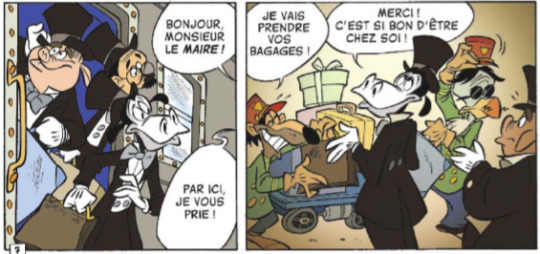
Claire is a fortune teller, a friend of Minnie whose advice she seeks in tricky situations. In the first story Minnie particularly seeks her advice for a matter concerning Horace and her job and Claire is happy to assist her.
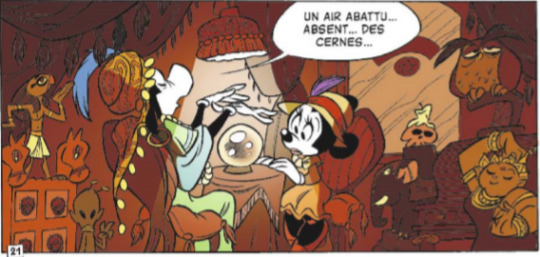
Now, disney fans usually know that these characters are in most stories portrayed as engaged or in a relationship, so in this scene it’s established that in this narrative they don’t know each other (yet).
But for readers not so familiar with the disney canon (as I was when I first read the story) who don’t know that Claire and Horace are meant to be together, this scene still establishes them as two individuals associated with the main characters.
In both cases though, a link is made subconsciously between Claire and Horace, forming a base on which their relationship will be built.
As concerning the plot, this is the moment when Claire first hears about Horace who -as he’s the mayor- undoubtedly has heard of before (if not voted for) and she has her first glimpse in his private life through Minnie’s sayings. It’s a nice starting point in this episode for their subplot to begin.
In the second story, “Vasetto sospetto’‘, Claire and Horace don’t appear at all so I won’t bother examine this one.
In the third story though, “Crociera con ghiaccio”, we have the next clue.
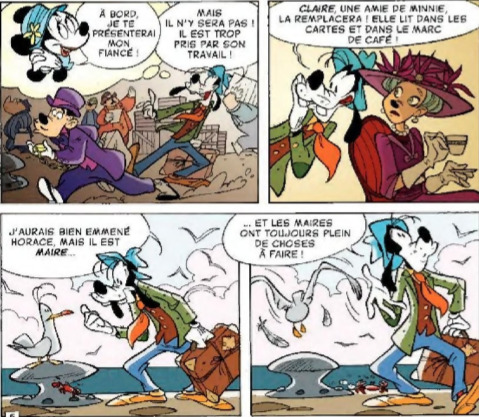
“ [Mickey] won’t be able to attend [the cruise], he is very busy with his work! Claire, a friend of Minnie, will replace him (...). I could have taken Horace with me but he’s the mayor and mayors always have many things to do”
Once again Claire and Horace don’t interact and once again a link is made between them by reffering to them in such a way.
Here we are presented with a motif which is very important in “Pippo reporter”. The motif of ‘failed meeting’ as I call it. It has been established in previous stories that main characters (mainly Mickey and Goofy) had had many chances to meet all of which failed in the last moment.
Some other examples:
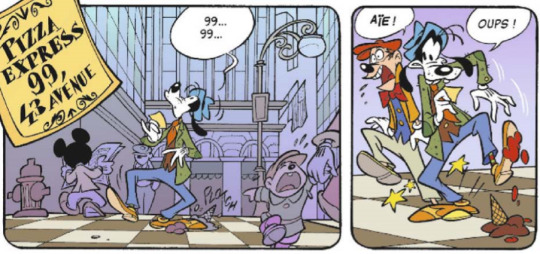
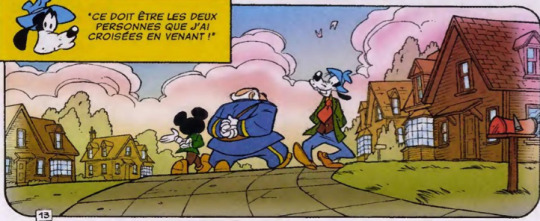
The reader, knowing by experience that those meetings are the most important plot points and meant to be epic (everybody knows that Goofy is Mickey’s best friend) now applies the same motif to Horace and Claire, even if they are not familiar with them.
Progress is also made in the fourth story, “Finale di campionato”
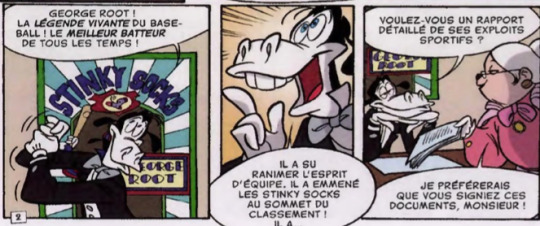
Here we learn Horace’s fascination with baseball and the whole plot revolves around him looking almost identical to his favourite baseball player, practically being his clone.
Horace ends up taking his idol’s place in the championship after the athlete’s mysterious disappearence.
Where has this player gone to?
At Claire’s aunt’s farm in the countryside trying to escape his overwhelming life as a sports celebrity!
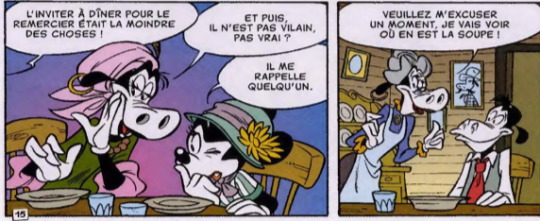
“And he’s not at all ugly, isn’t he?” rushes to comment Claire upon first setting eyes on him.
That’s what I call forshadowing!
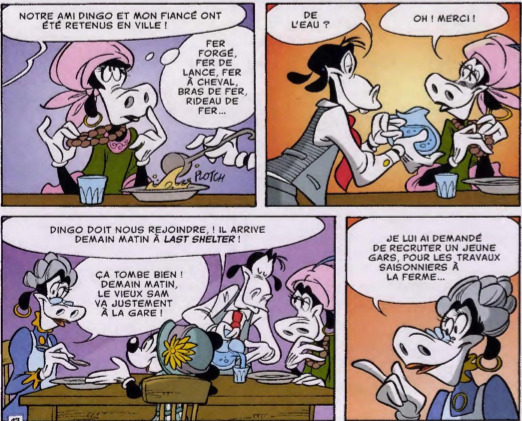
And her physical attraction to him persists on the entirety of the story. The first solid base is set for her later meeting with Horace and her -now undoubtful- falling for him. At this point, even for not disney connaisseurs, it becomes evident that Claire will be Horace’s love interest.
Their official meeting happens in the fifth story, “La perla del fiume”!
I think that all necessary setting up has been established from previous episodes and now we are finaly ready -and curious- to witness their meeting!
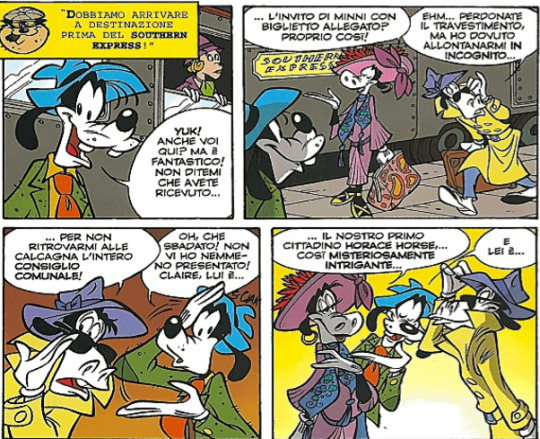
Goofy: Oh, I haven’t introduced you! Claire, this is...
Claire: Our first citizen, Horace Horse, so mysteriously intruguing!
Goofy: And she is...
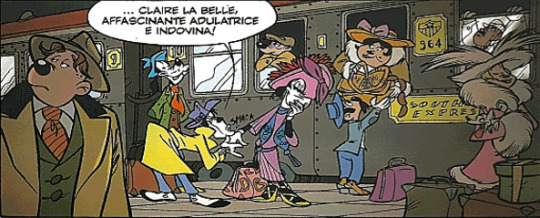
Horace: Claire la Belle, fascinatingly charming woman and fortune teller!
The attraction is instant and evident! A “love at first sight” that is actually believable. Why that? Because proper setting up has preceeded. It’s not the sudden ‘‘love montage’‘ that we ‘d get form a disney movie (I’m not accusative, I actually love them).
I can’t actually find a scene from the saga that explains how Horace already had heard of her, but with some guessing and common logic, I can assume that either Minnie or Goofy (who by now are his close friends) would have surely mentioned Claire to him and her involvement in some of their previous adventures.
It’s really realistic how they came together, getting to know each other through mutual friends.
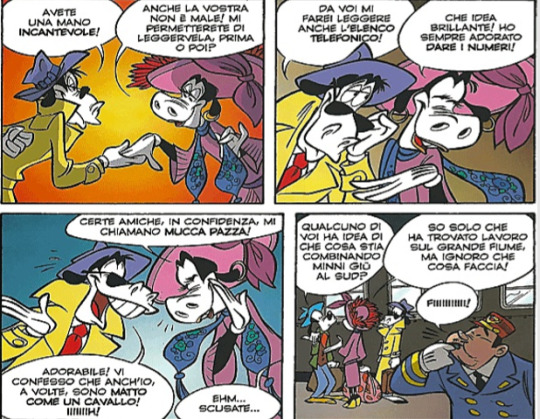
Hoarce: You have a lovely hand!
Claire: Yours isn’t quite bad either! Would you mind me reading it sooner or later?
Horace: I would also have you read me your phone number!
Claire: What a brilliant idea! I always loved giving numbers!
They’re meant to be! (poor Goofy third wheeling)
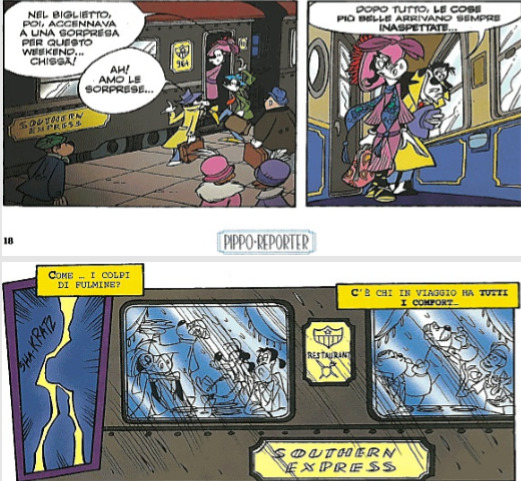
I love how from the first moment they can’t get their eyes from each other.
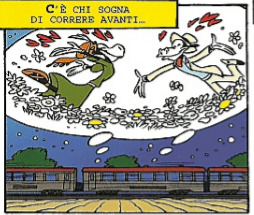
There’s no more to say! They are so cute!
And they soon, almost at once confess their feelings to their friends (tbh Horace does try but Goofy is kinda oblivious, Minnie on the other hand is much more in sync).
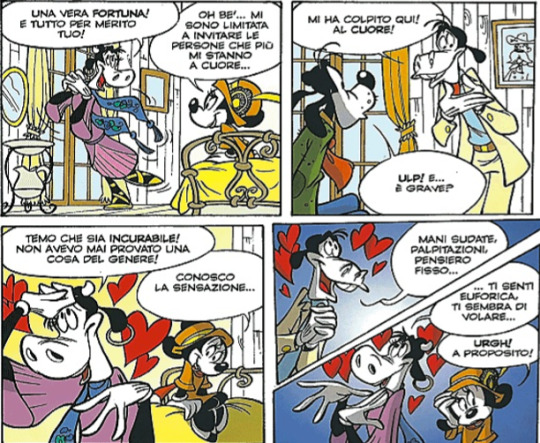
And there is obviously a ball which they attend together:
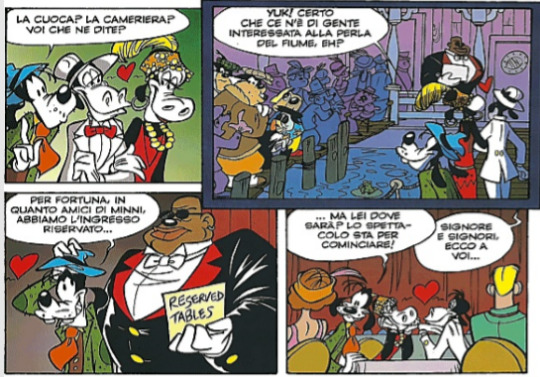
I really like how Turconi makes sure to make their love so evident throughout the story’s events, event at a paranoic degree, just to show how in love they are:
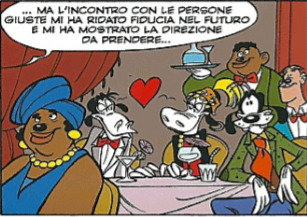
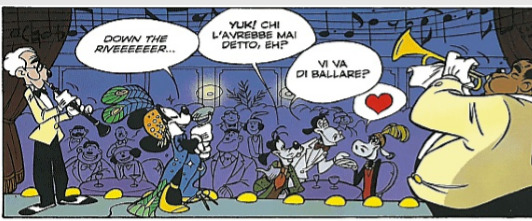
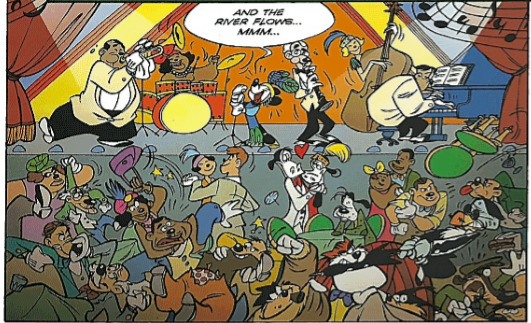
I ‘m sure someone’s getting their ears chopped off in that fight but they keep dancing serenely. And poor Goofy just ... exists there (I feel you fam)
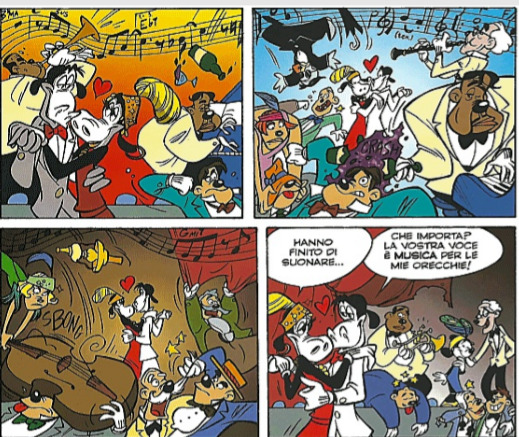
Claire: They have stopped playing the music...
Horace: Does it matter? Your voice is music to my ears!
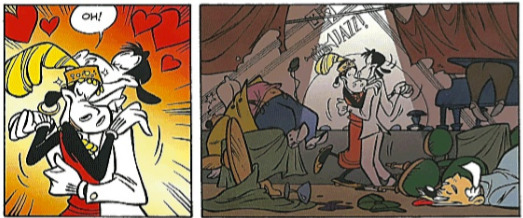
I don’t know the bodycount of that fight, but good for them!
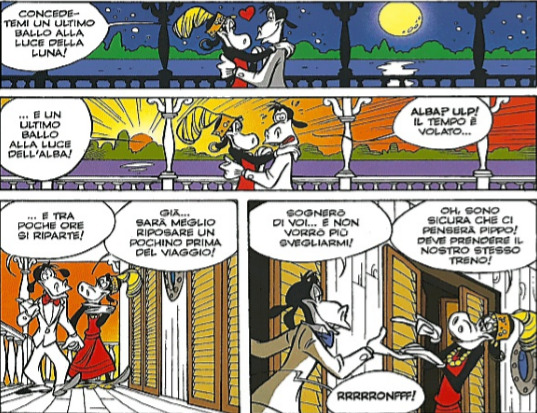
Claire: May I have this last dance under the moonlight?
Also Claire: May I also have this last dance under the sunlight?
And that concludes the ball and starts their relationship (dating at this point to be precise)
I particularly find the story’s ending very touching:
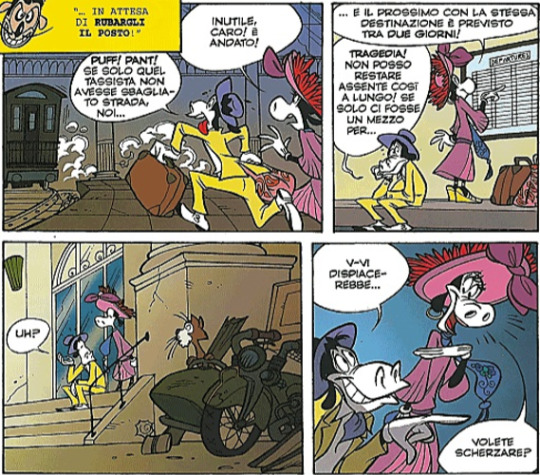
Horace: *spotting the motorcycle* Would you mind ... ?
Claire: Are you kidding?
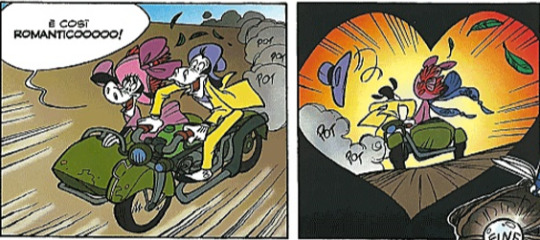
Claire: It’s so romantic!!!
At the very next story (”Un ombrello, un capello, un monello”) they’re already a couple:
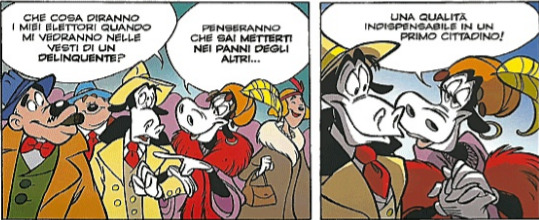
The romance reaches its peak in “La piuma d’ oro” in which they get officially engaged and have their first (shown) kiss. This is actually the core of the whole episode and their relationship is for the first time, not a sideplot, but the actual plot.
[ you will excuse me but I sadly don’t have any pics from this story
have this little heart instead --> <3 ]
Their sideplot may have already concluded in “La piuma d’ oro”, but them being a couple now gains a plot forwarding role.
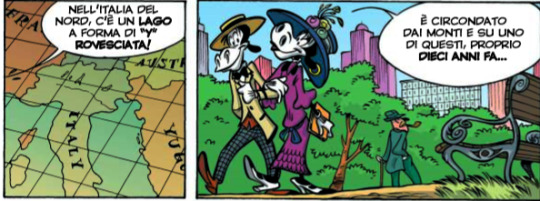
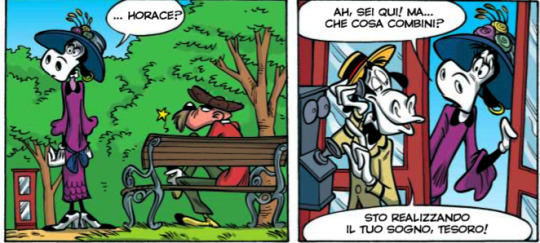
Claire: But what are you doing?
Horace: Making your dream come true my treasure!
In “Quel faro sui monti del lago” the characters find themselves entangled in another adventure only because Horace takes them on vacation in the place where Claire dreams to go (get you a rich mayor for fiance ladies)
And it’s time for their relationship to have its first test! While on vacation they meet this beautiful German (who **spoiler** turns out to be a spy)
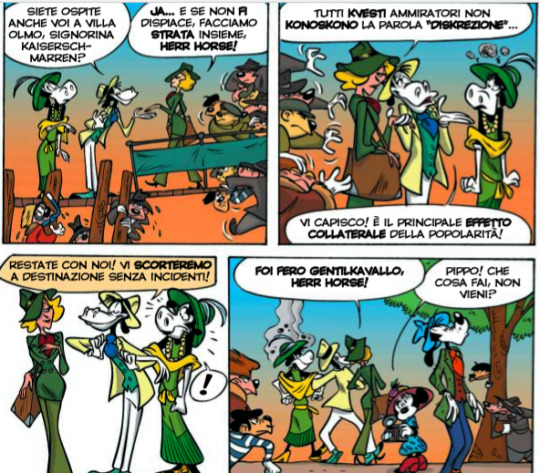
Instant dislike! (I still prefer Silvia Ziche’s designs of displaying jealousy but Turconi gave us this fashionably annoyed Clarabelle so I can’t argue)
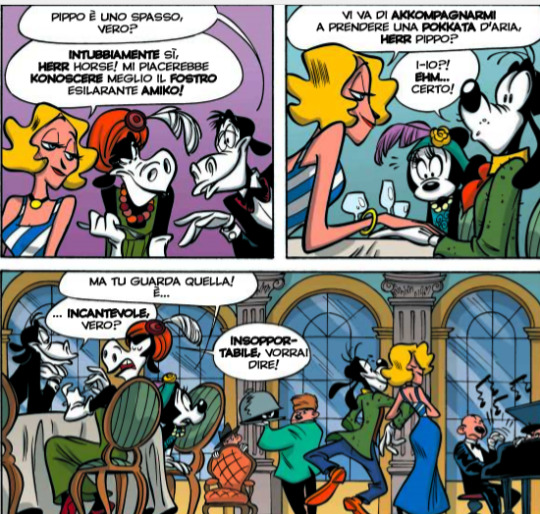
It was about time for them to endure jealousy. As in real relationships after some while not everything is seen through rose tinted glasses.
Still, everything turns out okay, leading to their last appearence together in the saga in the final story, “ Il rustico cavallerizzo”.
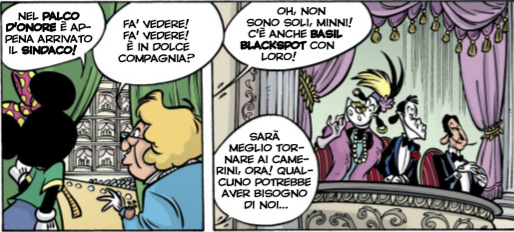
Minnie: The mayor has just arrived in the box of honour!
Lady: Let me see! Let me see! Is he in sweet company?
That’s how we leave them, together, officialy a couple and happy!
In conclusion, I really liked how this series treated them. Radice took time to first develop them as individuals, give them distinct personalities that also work apart. She made also sure to make them compatible and discretely foreshadow their romance, so when it comes it doesn’t feel forced or rushed but expected and natural. They also remain consistent as side characters who don’t disappear after their sideplot is concluded. They continue making appearences, both together and individually, that also forward the plot. The relationship between them evolves gradually, passing through different levels and situations to arrive at the point of ‘‘cannon’‘ events (by which I mean the disney lore outside of the saga).
I think that I said all I wanted to say, perhaps even more that needed to be said. But as I really like those characters and as I am a great fan of Radice and Turconi’s work I couldn’t pass up this chance to talk about them!
Thank you for reading and coping with my blabbering!
#this took two days to write#but I am mostly satisfied#if anyone has pics from ''la piuma d' oro'' it would be a real treat#analysis#pippo reporter#not duckverse#clarabelle#horace#stefano turconi#teresa radice
30 notes
·
View notes
Text
The Issue with Gen’s wasted Character Potential
With the manga about to reach its end I thought it worthwhile to have a closer look at how Gen’s character has been written. And the conclusion I'm coming to is that things started promising but then ended with already established potential not getting used.
Let’s start at the beginning. I don't believe that by the time of their introduction, any of the Sato squad’s new members had a clear and finished backstory. Or if, that it must have gotten changed while the story was progressing.

At this point it is difficult to say what the initial intention had been. But looking at Gen’s introduction, I always had the impression he and Takahashi didn't use to know each other before, came to the meeting alone and met there for the first time, instantly developing sympathy for each other. Something of the body and facial language in their first panel just seems too distant for me to signal anything else. And taking into account that until chapter 66.5 it hadn’t been confirmed that they shared a backstory, I view an individual arrival still as a possibility. Gen stating some time after the Grant Pharma arc that he possesses no ghost is no contradiction; just because Kou was clumsy enough to attract attention and got caught doesn't mean Gen wouldn't have been able to attend the black ghost meeting undetected.
Either way, only moments later, as soon as Sato's plan was established, he and Takahashi were able to quickly adapt to the situation and work together in harmony. Be it because they used to already know each other or by forming an instant strong connection. This moment already established the pattern that functioning together came easy to them while with Tanaka in the equitation friction would develop easily. But interestingly on the newly formed team all disharmony vanished at first, the operation on Grant Pharma ending a success.

I think this is about the only time in the manga where Gen is completely on his own and it’s impressive how good his nerves are during this moment. He stays calm, analyses the situation and delivers the needed information. And he has to do all of this while Takahashi is constantly being killed right next to him, yet Gen doesn’t get nervous at all.
That kind of levelheadedness would last until into the Forge Arc. And then getting reduced for the sake of preparing a “twist” lacking any solid foundation. Regardless of what one thinks of Gen being human or him and Takahashi supposed to have been brothers all along, from a storytelling perspective it makes zero sense to hide this all away from the reader until the last second. Like, that’s it? That’s the twist? How is this supposed to be relevant again? One of the random sidekicks to the main baddy –who you always knew wouldn’t have a chance to make it to the end- died instead of having gotten captured. I doubt anyone but the less than 20 people who used to ship takagen cared. These characters were about to disappear from the story either way, the average reader wouldn’t care about the surrounding details because these two were not the kind of characters that were given enough relevance. Or more, after a strong introduction, relevance and focus kept getting taken away from them.
Because relevance is the second factor why the reveals at the end were a bad way to progress the story. Since it got clear that some intended surprise was along its way (being shocking for the purpose of being shocking always looks forced), Takahashi and especially Gen were shoved further away into the background of happenings, given little to do. And that was a waste, frankly, taking into account how active both of them were allowed to behave shortly after their introductions. Remember them both supporting Sato with their sniping skills during the Grant Pharma attack? Sniping is a task complicated to do right but both of them were proving to be capable. Together and on their own: The moment Takahashi was taken out by enemy snipers, Gen was perfectly able to calmly overview and asset the situation, like this gathering together the information Tanaka needed to advance further and deal with those threats.
So, you have these two characters who have proven to be capable during stressful situations with a reliable mind and then the manga just… shoved them aside. Not just by lessening focus on them but by downright ignoring the ways they would have been able to contribute to their team. Cutting their teeth and claws further and further, first by putting more of a focus on their drug using habits (edgy. Now we know they’re bad guys for sure. Don’t get me started on addiction getting used as an indicator of morality) and then taking this further until they were reduced to not much more than moving props clowning around in the background. Compare that to Okuyama, whose early established technical skills kept getting efficiently used to advance the plot.
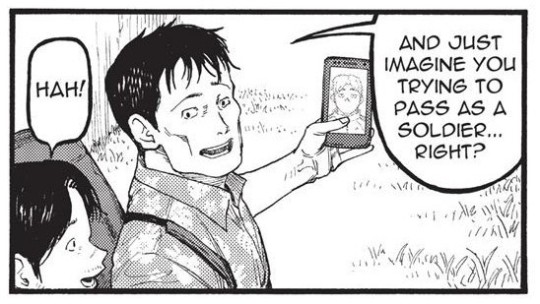
The curse got broken. After years of silence chapter 59 finally allowed Gen to speak again. Unfortunately barely anyone still remembered he existed or what he had brought to the plot so far.
Letting all this potential go to waste, for what? Because more of a focus would have threatened to reveal those wannabe twists? Something that turned out as boring as “one was human all along but the writing never told us that for no good reason”. It is hard to imagine after all the Sato squad was unaware about this important little detail: Not with their habit to regenerate themselves or their injured comrades via shooting themselves back to life during operations. With this they would have needed getting informed about Gen not being an ajin.
And the sudden sibling status about to get introduced resulting in “Gen’s dialogue needs to get reduced into nothing, otherwise it would become too obvious he and Takahashi being brothers was a last minute idea, with them going against local conventions by not calling each other “brother”, instead using their last names ever since.” Yeah, how did that work out? Now we have actual implied canonical incest because Takahashi and Gen being related changed nothing about the fact they were giving off the most obvious couple vibes this manga had to offer, making it look they were actively hiding being related. Where did it go wrong? Was “Gen is human” installed as a possible twist last minute late in the game, kept nebulous in case some better idea came up? (The hints were always vague guesswork at best, supposed to be able to go both ways, and unlike the anime the manga didn’t have the foresight to prepare it as believable by keeping Gen out of the most dangerous situations and reducing this drug consuming habit to a zero. So, am I supposed to look at it as a deliberate suicide mission on his part in manga context? Was his nihilism this deeply rooted here?) And what about the sibling retcon? Was “he joined this non-human extremist group for the sake of supporting his friend” sounding too gay an explanation, so in an attempt to erase that away they were retconned brothers? Would at least explain why those two look absolutely nothing alike despite supposed to be related.
Ironically this accidental incestuous implication was the only element working here in favour of story telling and character development. Disillusioned incestuous couple disappointed with life drifts into nihilism and thus resonates with Sato's ruthless modus operandi? Now that's the kind of variation and originality I like to see in fiction.

Interesting how Gen just shrugs his shoulders and goes back to routine once told the hostages already served their purpose. Zero sentimentalities to be seen.
I’m glad the story at least let those two stay loyal to Sato until the end, keeping the last bit of relevance in place that differentiated them from their (former) teammates. Takahashi and Gen had bloodthirsty motivations long before they met Sato, so it makes sense those shared similarities kept deepening the bond of those three. It makes sense on a level of characterization and interpersonal relation as well: I’d go as far as to say that Sato was most likely one of the few (the first?) people who accepted them the way they were. Attentive as he was it is hard to imagine he would have missed any aspect of the nature of their relationship. Yet his demeanour towards them never changed, more, as time went on the three of them grew closer. Being met with this kind of acceptance, it is easy to see why Takahashi’s and Gen’s loyalty towards Sato would have strengthened over time as well. Add to this that those three had a pretty similar mind set and voila. A unit that could have had it all, hadn’t it been for the story’s need to play it safe and prepare circumstances so the “good” guys (anyone seriously believing the status quo of using captured ajin for experiments would have changed without outside pressure?) win because of reasons.
This manga has many strengths but the recent habit to insert plot threads that keep dangling and are leading to nowhere or constant retcons that backpedal on what was previous established are none of it. Seeing how the manga started losing its way shortly after the Forge Arc ended and how the plot is now stumbling around in an attempt to reach an ending has been a disappointment, exactly because the story already has proven so many times that it can be excellent under the right circumstances. Alas, hope gets snatched away last.
13 notes
·
View notes
Text
Spirituality in islam: Sohba and Musahaba (Conversation and Communion)
Sohba (Conversation) means making effective speeches to direct people to the Almighty, enlightening others with words and thoughts, using other’s good opinions of oneself to guide hearts to eternity, and always wishing well for others. The famous Turkish Sufi poet who lived in the 13th century, Yunus Emre, stresses the vitality of conversation and communion (musahaba) in this sense, saying: “What sets the soul right is the conversation of saints.”
With respect to the relationship between a guide and the initiates on the Sufi way, there are two things which lead initiates to the truth: a guide’s conversation and communion with his disciples and their serving in the lodge where the guide teaches. Serving is a means of being favored with the guide’s special attention, and conversation or communion, which has been considered as an important means employed by the guide that is greatly beneficial, is a way to feeling and experiencing truth with all one’s inner and outer senses. Nevertheless, benefiting from the guide so that one is “colored” by him depends on the rank of the guide. Every guide has an influence upon his disciples in proportion to the degree of his rank. The most perfect and greatest guide is the Almighty Himself. That is why the master of creation, upon him be peace and blessings, took on the universal, brightest color due to his being addressed by Him in the Revelation. The verse (2:138), Take on God’s color perfectly; whoever can be more beautiful in color than God?, indicates this fact. After him come all the other Prophets and pure, verifying scholars and saints, who vary in the colors they have taken on, according to the rank of guides and the capacity of each to take on the color. All the scholars and saints who have and will come after God’s Messenger have been and will be dependent on him and his guidance, both in taking on color and coloring their disciples. However, as mentioned before, both the coloring of others and taking on color varies according to one’s capacities:
Everyone benefits from God’s enlightening gifts according to his capacity;
A snake receives poison from April rain, and an oyster a pearl.
Service denotes seeking God’s good pleasure and approval with sincerity and purity of intention, and putting oneself in the hands of one with whom God is pleased for teaching and guidance. As for communion, this means attending the courses of a friend of God with a heart whose doors are opened to Divine favors and blessings, and sharing his aura of holiness within which the Divine manifestations of grace pour forth. The Companions of God’s Messenger were the most advanced of all in serving, and were accordingly favored with the most enlightened communion. This was due to the fact that the one who taught and held communion with them was the greatest of creation, whose single look was enough to cause the souls endowed with the necessary capacity to rise to the high horizons of perfection. We should also point out that his disciples, those heroes of steadfastness, who put their hearts, senses, consciousness, and will power into orbit round that sun, had the necessary capacity and performance.
Every friend of God is favored with coloring those around him or her to a certain extent. The range of this favor is very broad, from a friend of God whose light may be likened to a candle in darkness, to those whose light may be likened to radiant stars that light up whole galaxies. In addition, as pointed out before, as with every guide or friend of God, those who benefit or receive light from them vary in their capacity. This means that the extent or degree of coloring on the part of guides varies to the number of the capacities. So there are as many ranks or degrees of coloring and being colored as there are Prophets, spiritual guides and initiates who benefit from them, from the greatest of creation, who is the most polished mirror of the Light of Lights, to the one who has just taken his or her first step on the spiritual journey. The communion or conversation of the one who was universally favored with coloring others was so influential and so great a blessing for him that no one has ever been, nor will ever be, able to attain it. Consider the fact that those who were honored with the conversation and companionship of him, who said, “The first thing which God created is my light,”[ Al-Ajluni, Kashf al-Khafa’, 1:265. ] were and have been called with the of Ashab (meaning the friends with whom he communes), not with another even though they were the fortunate ones who traveled to God most eagerly and sought His good pleasure and approval most of all.
Everyone listening to or sharing the atmosphere of a guide, observes in his every manner his belief in the Single, Besought-of-All, his knowledge and love of Him, and the degree of his relationship with Him. Influenced by all these blessings that the initiates observe in the guide, they find themselves in an indescribable mysterious spiritual atmosphere. Those flying toward the “Sun of Suns,” attracted by the centripetal force of a guide, both benefit from his knowledge of God and follow in his footsteps to reach every point that he has already passed.
I think this is also the reason why people gather around spiritual guides who are sources of radiance, and develop as particular spiritual institutions or schools. It is because of this that in the early periods of Islam, the Muslim Sufis who sought to strengthen or consolidate their individual relationships with the All-Radiating One, came together in dervish lodges or similar institutions of enlightenment where the Truth could be “observed” beyond all concepts modality. In those buildings of light, which they saw as being similar to the hall adjacent to the Prophet’s Mosque in Madina, where those of the Companions stayed who had dedicated themselves, during his lifetime, to studying the Qur'an and the Sunna.They sought the way to develop an atom into a sun, a drop into an ocean, and to change the darkness of corporeality into light. As this was the main reason for the appearance of dervish lodges and distinct spiritual orders in later centuries, it is not possible to claim that they are incompatible with the spirit of Islam. Moreover, since everyone has weaknesses or shortcomings of character that they cannot overcome alone, being in the company of others seeking the same goal attracts God’s special help and protection. A member of a community or group thinks with many heads, turns to God with a collective heart, strengthens the entreaties of one voice with the entreaties of many, and turns his or her individual notes into the melody of a chorus.
Those who have come together around the same feeling, thought and goal have such a depth in their turning to God in unison, such a richness in their consciousness and feelings, and such a profundity in their thoughts and concepts, that individuals of even the greatest capacity and perfection cannot attain the least of the blessings that come their way in their community. In the illuminating atmosphere of communion, benefiting and causing to benefit, enlightening and being enlightened, feeling and causing to feel occur differently and in an abundance peculiar to that atmosphere.
In fact, the most important purpose of communion is that belief should be supported with a knowledge of God, a knowledge of God that is based on any of the degrees of certainty, by making journeys at the levels of life of the heart and spirit under the guidance of the Truth of the Prophet’s being Ahmad, and these journeys are accompanied by a conscious observation. The most important capital and endowment of the initiates during such journeys and observations is that the inner faculties are aroused with the actions of the heart and voice, for example, the recitation of God’s Names and reflection, and the demonstration of their deserving Divine gifts. Since deserving such gifts can only be acquired by following the Message of the master of creation and therefore bears witness to the truth of this Message and the Messengership of him who brought and preached it, this decisively proves that he was absolutely truthful in all his speeches and actions.
Benefiting from the communion or conversation of spiritual guides depends, in one respect, on the initiates’ humility and feelings of nothingness, and of their being freed from the influence of their carnal selves. If travelers to the Truth have not been able to completely free themselves from the influence of their carnal selves and to rise to the point of always preferring God’s commandments and obtaining His good pleasure and approval over their own views and desires, they may commit the error of attributing to themselves being favored with some gifts or the development of some of their faculties. Instead of always being thankful to God, they may become conceited. Furthermore, if they are sometimes and temporarily favored with the feeling of attraction and being attracted (toward God by Himself), they may roll into the valleys of uttering words of pride that are incompatible with the rules of Shari'a, and therefore suffer loss upon loss, although a spiritual journey should be a means of gain after gain.
In fact, those who do not converse or commune with their disciples in accordance with the rules of the way of God’s Messenger, upon him be peace and blessings, cannot always maintain the balance in the spirit of Islam and may display relaxed attitudes or make utterances that cannot be reconciled with their rank or position. They may even go so far as to prefer sainthood to Prophethood and, favoring the principles and manners established by the founder of their orders over those of the Prophetic way, commit such great errors that it as if one chose to be illuminated by a candle instead of by the sun. Besides, those unfortunate ones who prefer sainthood to Prophethood will naturally see their guides or masters as being greater than the Companions, who were the foremost and most distinguished students of Messengership. This will denote that communion has changed places with gossip, that spirituality has become darkened in its own home, that the essentials originating in the Divine sources have been replaced by those of personal choices and desires, and that there no longer remains the sacred power of attraction which the spiritual guides and their aura must have. As Muhammed Lutfi laments:
Those who were valiant have melted away like butter;
Lovable personages have all been reduced to dust.
Thorns have grown in the place of flowers;
Honeycombs have shrunk and been emptied of their honey.
The communions and conversations which resemble idle talk in cafes bring nothing in the name of Divine gifts and never assist the disciples to attain the truth. Rather, Satan intervenes in their frequency and sends out sparks. So, every action that is in the guise of a spiritual interaction in these places, which appear to be homes of spirituality, but have long since expelled sincerity and the feeling of being seen by God, is only a deception or even perdition, and expecting God’s special favors is nothing more than mere illusion. Those who attend such places as if they were attending a united congregation are only joining in a spiritless ritual. In addition, if they regard criticizing and quarrelling with others, rumormongering and slander, and cherishing ill-opinions about others as religious services, then they are gravely mistaken; the places they attend are only places of hypocrisy and their guides are not Sufis, but rather bigoted highwaymen. Who knows that such attitudes did not cause Destiny to allow the banning of such and the closing of the ways that led to their collapse?
Autumn winds have blown and the vineyards have withered away;
And there no longer exist the gorgeous roses in the gardens.
O God! Favor us with a happy end to our affairs, and protect us from loss and humiliation in the world and punishment in the hereafter. And bestow Your blessings and peace on the master of creation, Muhammad, and on his family and Companions, the noble, godly ones.
#allah#god#islam#muslim#quran#revert#convert#convert islam#revert islam#reverthelp#revert help#revert help team#help#islamhelp#converthelp#prayer#salah#muslimah#reminder#pray#dua#hijab#religion#mohammad#new muslim#new revert#new convert#how to convert to islam#convert to islam#welcome to islam
2 notes
·
View notes
Text
Data Hearts: Analyzing The Grid’s Status as a Sleeping World
This idea spawned out of a discussion in the Discord server for the Soriku Ultimania, when we discussed the whole “Nobodies don’t age” discourse and came to the same conclusion found on Tumblr, that as evidenced by Ven, the true statement was that bodies without hearts don’t age, so the Nobodies aging between BBS and COM/KH2 was a subtle hint at their ability to develop hearts on their own.
Later on, the conversation shifted towards the nature of data world’s and Young Xehanort’s line about The Grid in Dream Drop Distance that “data does not dream. Cannot dream,” and that The Grid was a real world as opposed to the other sleeping worlds.
However, Young Xehanort shouldn’t be taken at face value. Later in the game Xemnas and Xigbar confirm that Nobodies are actually capable of growing hearts, meaning that any character’s words, particularly those of an incarnation of Xehanort, should not be taken as the literal, objective truth.
If we take Young Xehanort at his word that data cannot dream under normal circumstances, then we should be asking ourselves under what circumstances would data be able to dream?
Let’s think about what the data version of DiZ said at the end of Dream Drop Distance: given enough interaction and connection with another person, anything can grow a heart – a wooden puppet like Pinocchio, Nobodies, even a piece of data like Tron. That last one was already proven with Data-Sora and Data-Riku in Re:Coded.
The logical conclusion of Young Xehanort’s line, then, is that you need a heart in order to dream. Most data, lacking a heart, is not capable of dreaming. So how would The Grid be a sleeping world then? Well, there is one character in that world who does have a heart.
You’ll recall that Tron’s introduction in Kingdom Hearts II establishes him as the custodian of Space Paranoids’ data and all the information compiled in Ansem’s computer system.
Now, does that not sound familiar to a concept we see fleshed out more in Re:coded?

Tron’s role in the backstory of TRON: Legacy was to serve as the protector of The Grid and its data, in a similar fashion to the role that Data-Riku fills in the Jiminy’s Journal datascape. The Grid can fall into darkness and become a sleeping world for much the same reason that Jiminy’s Journal would fall if Data-Riku’s heart was lost.
But…. That does raise a few questions. The Tron we meet in Space Paranoids is explicitly a copy of the original, so why do he and Rinzler have the same heart in DDD? Sora and Data-Sora’s hearts are treated as separate by the narrative. So why are Tron and Rinzler treated as having one singular heart?
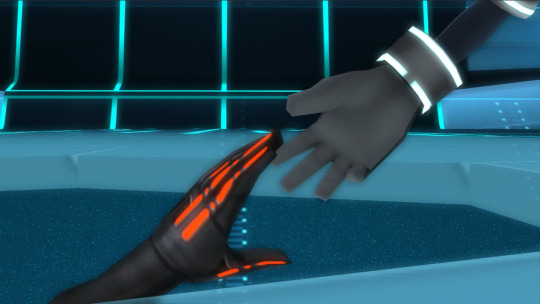
And this is where I started thinking deeper.
We assume that Tron was copied from the Encom server before Kevin Flynn converted the data structure from Space Paranoids to The Grid.
But what if that wasn’t the case?
The last we see of Tron at the end of TRON: Legacy is when he’s sinking into the sea of simulation, his circuits reverting to white as he breaks free of CLU’s reprogramming.
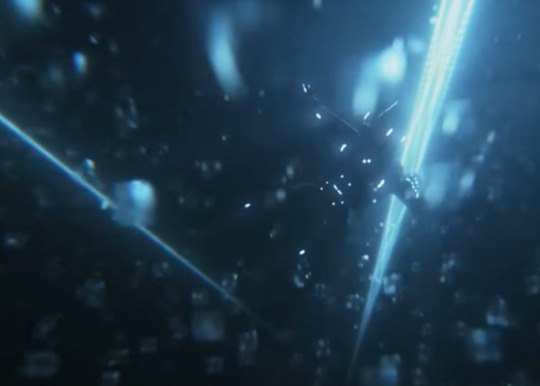
Falling into water in Kingdom Hearts is repeatedly used to indicate that a character has symbolically fallen into Darkness. What if the copy of Tron we meet in Kingdom Hearts II was created after the original Tron and his data world fell to darkness?
But how does this explain why Tron and Rinzler share the same heart? Well, think for a second. What other characters have been shown to have a heart shared across different copies of themselves?

At minimum four members of Organization XIII were slowly re-growing new hearts after being reborn as Nobodies, and after their Nobody selves were destroyed and they were recompleted, their original hearts seamlessly merged with their second hearts.

If The Grid fell to darkness because the original Tron lost his heart, and the copy of Tron in Space Paranoids eventually developed a heart of his own, then the reason that Tron and Rinzler are shown having the same heart in Dream Drop Distance is because Tron is functionally the data equivalent of a Nobody. A copy of someone whose heart has been lost to darkness, but one which can grow a replacement heart given sufficient social interaction, and whose new heart will smoothly merge with the original when recompleted.
And what happens in Dream Drop Distance? The original Nobodies are recompleted. Right before Sora goes to The Grid, we see Lea, Dilan, Aeleus, Even, and Ienzo regain their hearts and awaken on the floor of the lab, whole once more. And where do they wake up? Right in front of the computer that grants access to Tron and Space Paranoids. Not to mention, this scene canonically takes place right before Sora’s arrival on The Grid.
Not only that, the emotional climax of Sora’s portion of The Grid comes when Rinzler reaches out his hand to Sora based on the heart that SP!Tron had been growing, the two Trons’ hearts merging in that moment, recompleting Tron as Sora seals the sleeping Keyhole to release his heart from the nightmare.
In Summary:
The Tron we meet in Kingdom Hearts II is a parallel of the Nobodies. He began to grow a new heart as a result of his interaction with Sora, Donald, and Goofy, but he could not be fully recompleted because his original heart was still trapped among the sleeping worlds. The story of The Grid in Dream Drop Distance was about freeing the original Tron’s heart from its nightmare so that Tron could be recompleted, as a thematic parallel to how the founding Nobodies of Organization XIII were restored as complete people just before Sora’s arrival on The Grid. The Grid’s status as a Sleeping World is because Tron’s original heart had been lost to darkness and trapped in an endlessly repeating dream of the events leading up to the loss of his heart.
#kingdom hearts meta#kh speculation#kingdom hearts theory#kh tron#kh rinzler#kh space paranoids#kh the grid#kingdom hearts spoilers#kh spoilers#kh nobodies
34 notes
·
View notes